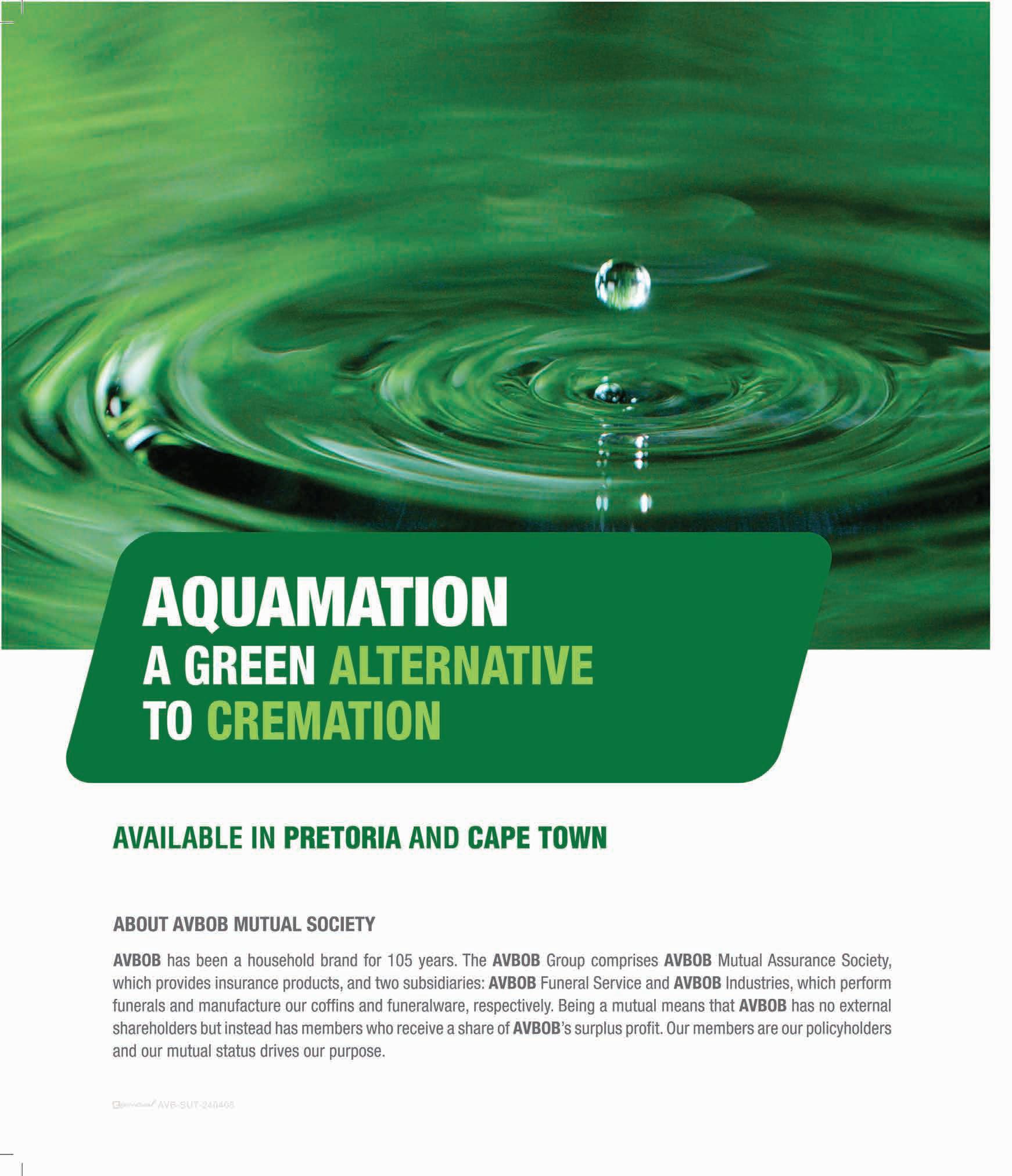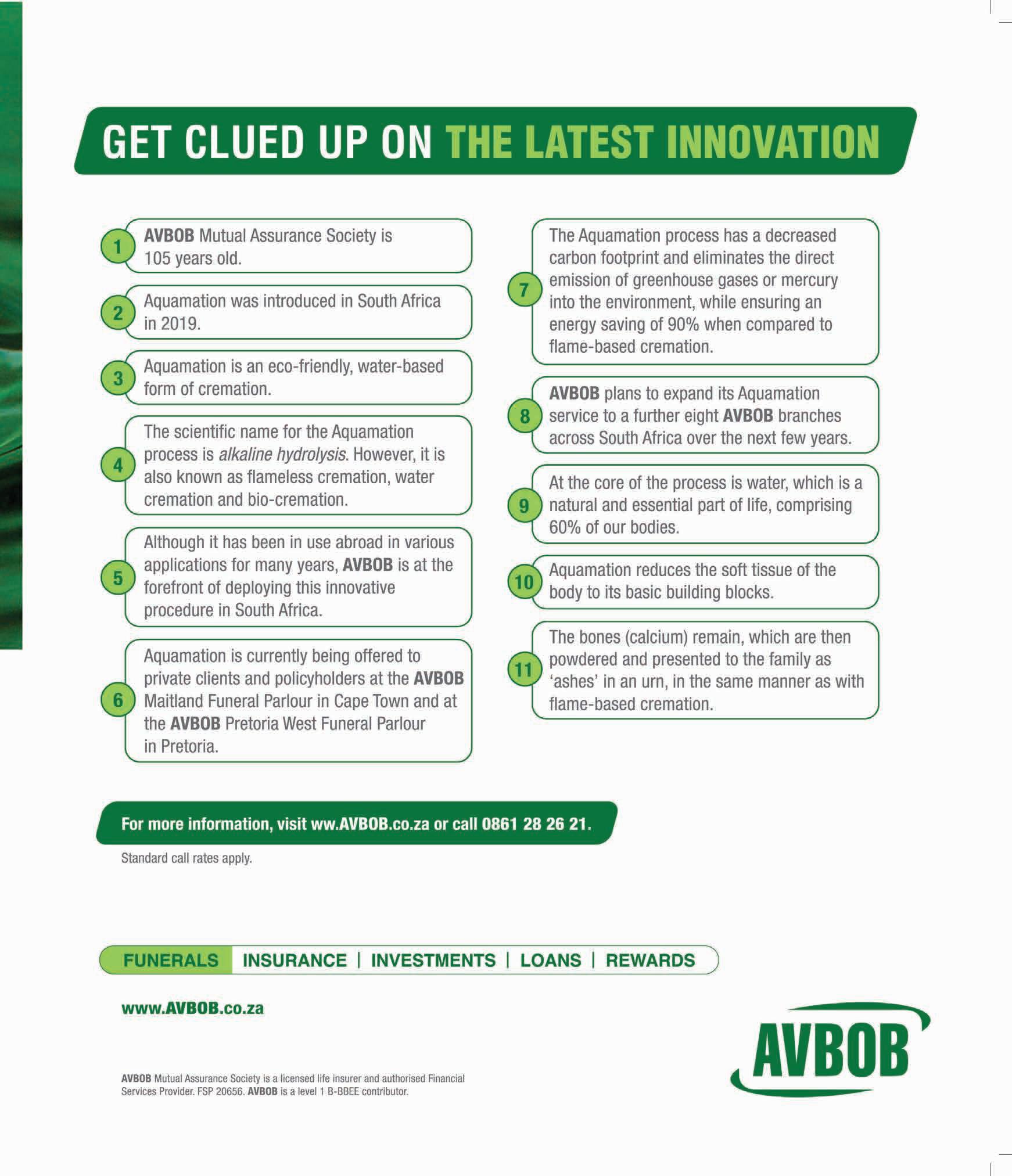










































































































































































































































































The right products, tools and vehicles are valuable assets in business, writes VOLKSWAGEN COMMERCIAL VEHICLES
In today’s dynamic business landscape, success hinges not only on vision and strategy, but also on the tools at your disposal. Every entrepreneur knows that having the right equipment can make all the difference, transforming daunting challenges into manageable tasks. Among the essential assets for any business is the utility vehicle, a workhorse that serves as the backbone of operations across industries.
Enter the Volkswagen Amarok, a name synonymous with reliability, versatility and performance. In the entrepreneurial journey where adaptability is key the Amarok emerges as a steadfast companion, capable of navigating diverse terrains and overcoming obstacles with ease. Whether you’re a small business owner or managing a fleet for a larger enterprise, the Amarok offers a range of options to suit your needs.
At the heart of the Amarok lineup are the Single Cab and the Double Cab, each designed to meet specific requirements and deliver unmatched performance. Let’s explore how these vehicles can elevate your business to new heights.
The Amarok Single Cab stands as a testament to Volkswagen’s commitment to practicality and innovation. Tailored for those who prioritise function and utility, this model boasts a range of features designed to streamline operations and enhance productivity.
One of the standout attributes of the Single Cab is its robust construction, built to withstand the rigours of daily use in demanding environments. Equipped with a powerful 2.0 TDI engine delivering 125kW of power and 405Nm of torque, this vehicle ensures optimal performance under all conditions. Whether you’re navigating city streets or venturing off-road, the Amarok Single Cab delivers a smooth and responsive driving experience.
But it’s not just about power; the Amarok Single Cab offers a host of intelligent features aimed at simplifying the workday. From the convenience of App-Connect for seamless smartphone integration to the safety of LED headlights and electronic rear differential locking axle, every aspect of this vehicle is designed with the needs of the modern business owner in mind.
With a payload capacity of 1.2 tonnes and a spacious load compartment measuring 2.3 metres long and 1.2 meters wide (between wheelhouses), the Amarok Single Cab offers ample space for transporting goods and equipment. Whether you’re hauling construction materials or delivering goods to clients, you can rely on the Single Cab to get the job done efficiently.
Key Standard Specs
• Engine: 2.0 TDI
• Power: 125kW
• Torque: 405Nm
• 6-speed manual transmission
• Rear-wheel drive or 4MOTION®
• Electronic rear differential locking axle
• Drive profile selection: Normal Eco and Slippery
• 1.2-tonne payload capacity
• 2.3m long x 1.2m wide load compartment
• 800mm maximum wading depth.
For those requiring additional seating capacity without compromising on performance, the Amarok Double Cab emerges as the ideal choice. Combining off-road prowess with ultimate practicality, this model redefines the concept of the utility vehicle, offering a seamless blend of comfort, capability and cutting-edge technology.

Like its Single Cab counterpart, the Amarok Double Cab is powered by a potent 2.0 TDI engine, delivering exceptional performance on any terrain. Whether you’re traversing rugged landscapes or navigating urban streets, you can count on the Double Cab to deliver a superior driving experience.
What sets the Double Cab apart is its versatility, making it equally suitable for business and leisure activities. With a payload capacity of 1.1 tonnes and a spacious load compartment measuring 1.6 metres long and 1.2 meters wide (between wheelhouses), this vehicle offers ample space for both cargo and passengers. Whether you’re transporting a team of workers to a job site or embarking on a weekend adventure with family and friends, the Double Cab ensures a comfortable and enjoyable journey for all.
Key Standard Specs
• Engine: 2.0 TDI
• Power: 125kW
• Torque: 405Nm
• 6-speed manual transmission
• Rear-wheel drive or 4MOTION®
• Electronic rear differential locking axle
• Drive profile selection: Normal Eco and Slippery
• 1.1-tonne payload capacity
• 1.6m long x 1.2m wide load compartment
• 800mm maximum wading depth
• 1900kg rear-axle load limit
• Rear park sensors and reverse camera.
In addition to their impressive performance and versatility, both the Amarok Single Cab and Double Cab come with comprehensive after sales service plans designed to provide peace

of mind and minimise downtime. With a threeyear/60 000km Genuine Easy Drive service plan for the Single Cab and a five-year/100 000km maintenance plan for the Double Cab, you can rest assured knowing your vehicle is covered for routine maintenance and repairs.
These maintenance plans not only save you time and money, but also ensure that your Amarok remains in optimal condition, allowing you to focus on growing your business without worrying about vehicle maintenance.
The Volkswagen Amarok Single Cab and Double Cab represent more than just utility vehicles; they are catalysts for growth and success in the ever-evolving world of business. Whether you’re a sole proprietor or a corporate executive, the Amarok offers the reliability, versatility and performance you need to thrive in today’s competitive marketplace.
By investing in an Amarok, you’re not just purchasing a vehicle; you’re investing in your future and the future of your business. With their unparalleled combination of practicality, performance and peace of mind, the Amarok Single Cab and Double Cab are truly the #DrivingForce behind success.
Take the first step towards transforming your business today. Visit www.vw.co.za to book a test drive to experience the power and performance of the Volkswagen Amarok for yourself and be the #DrivingForce that launches your success.
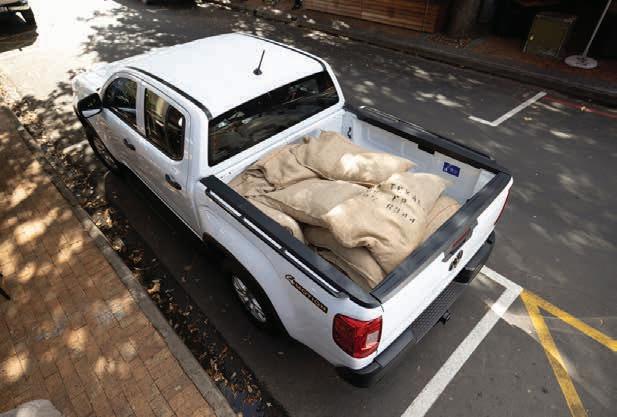


5 FROM THE EDITOR
With a focus on the township economy, South Africa could potentially address one of its most pressing issues: unemployment, especially among the youth.
7 ENTREPRENEURSHIP
An analysis of the dynamics of the township economy.
10 LEGISLATION
As the township economy becomes Gauteng’s new gold, the Township Economic Development Act seeks to formalise things.
18 TRENDS
We take a look at the influences impacting business operations in the township.
22 CIRCULAR ECONOMY
The so-called kasi economy is driven by micro enterprises across multiple sectors. We look at the growth of this market and its potential impact


31 BANKING
South Africa’s informal sector remains largely unbanked, but accessing cost-effective business banking options can help these businesses grow; The journey of the Young Women in Business Network (YWBN) – a new mutual bank – until the eve of its launch.
36 INCLUSIVE GROWTH
The informal sector has a crucial role in the global economy, and it must be connected to government and corporates properly to create opportunities to collaborate, learn and grow.
37 DIGITAL ECONOMY
Bridging the digital divide can unlock economic opportunities in underserved communities.
40 RETAIL
Shopping centres can improve economic prospects for township businesses and the lives of the people who access them.
43 PROFILE: FAST FOOD SECTOR
KFC, a leading South African fast-food brand, shares why it is committed to contributing to the township economy.
46 PROFILE: A TOWNSHIP STORY
Shape Café, a community-centric haven that not only serves beverages, but also fosters a nurturing space for local visionaries.
47 PROFILE: FMCG SECTOR
We follow Tiger Brands into the townships to see how the company’s Route-toMarket strategy is benefitting spaza shops.
50 LOAD SHEDDING
How local businesses are innovating to deal with unrelentless blackouts.


PUBLISHED BY
Picasso Headline,
A proud division of Arena Holdings (Pty) Ltd, Hill on Empire, 16 Empire Road (cnr Hillside Road), Parktown, Johannesburg, 2193 PO Box 12500, Mill Street, Cape Town, 8010 www.businessmediamags.co.za
EDITORIAL
Editor: Busani Moyo
Content Manager: Raina Julies rainaj@picasso.co.za
Contributors: Trevor Crighton, Siyabonga Hadebe, Itumeleng Mogaki, Thando Pato, Brendon Petersen, Rodney Weidemann, Lisa Witepski
Copy Editor: Brenda Bryden
Content Co-ordinator: Natasha Maneveldt
Digital Editor: Stacey Visser vissers@businessmediamags.co.za
DESIGN
Head of Design: Jayne Macé-Ferguson
Senior Designer: Mfundo Archie Ndzo
Designer: Bulelwa Sotashe
Cover Images: istock.com/poco_bw, istock.com/Rich Townsend, supplied
SALES
Project Manager: Tarin-Lee Watts
wattst@arena.africa
+27 87 379 7119 I +27 79 504 7729
PRODUCTION
Production Editor: Shamiela Brenner
Advertising Co-ordinator: Johan Labuschagne
Subscriptions and Distribution: Fatima Dramat fatimad@picasso.co.za
Printer: CTP Printers, Cape Town
MANAGEMENT
Management Accountant: Deidre Musha
Business Manager: Lodewyk van der Walt
General Manager, Magazines: Jocelyne Bayer
COPYRIGHT: Picasso Headline. No portion of this magazine may be reproduced in any form without written consent of the publisher. The publisher is not responsible for unsolicited material. TOWNSHIP ECONOMY is published by Picasso Headline. The opinions expressed are not necessarily those of Picasso Headline. All advertisements/advertorials have been paid for and therefore do not carry any endorsement by the publisher.
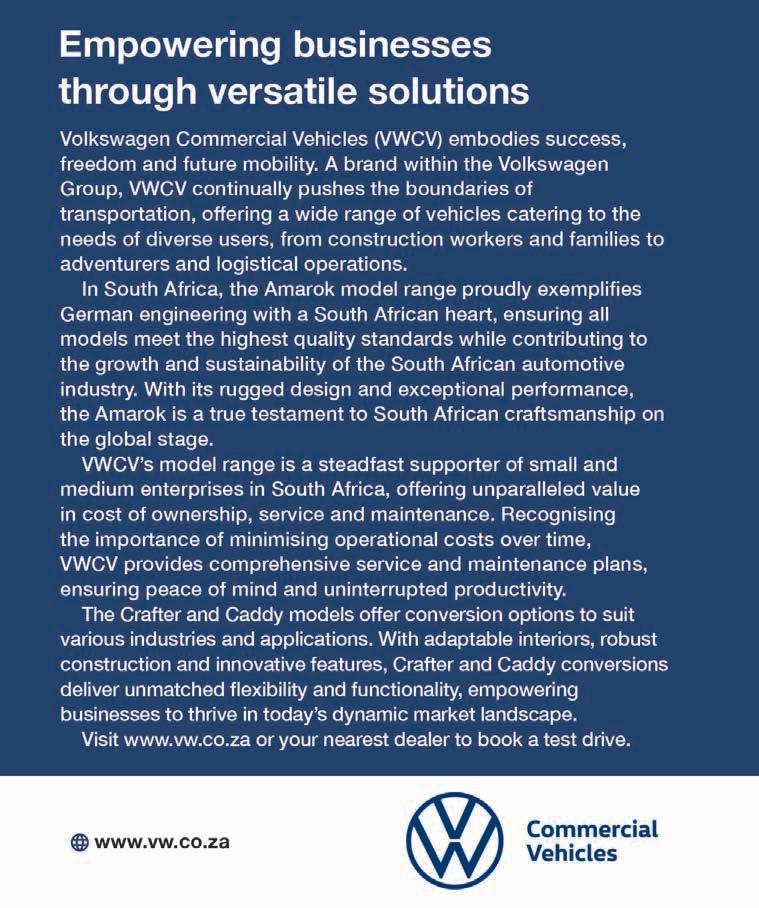
In the 1980s, South Africa produced 50 per cent of the world’s gold, but those days are gone. However, the premier of the Gauteng Province, South Africa’s economic powerhouse, is championing the township economy as the country’s new gold. With a focus on the township economy, South Africa could potentially address one of its most pressing issues: unemployment, especially among the youth. This requires integration, capacity-building and collaboration among various entities, including the government, private sector, communities,and nonprofit organisations.

In this issue of Township Economy, we go to the townships to identify some businesses that testify to the idea that the township economy is indeed the new gold. We discover how Shape Café in Sebokeng is giving township ideas a place to congregate, MTN is investing R2.2-billion in townships to boost participation in the digital economy and create connected communities, and Tiger Brands’ Route-to-Market initiative is bringing stock closer to spaza shops and helping owners to spend most of their time selling as opposed to travelling long distances to buy stock.
Our exploration also delves into the Gauteng Economic Development Act, a legislative effort to bolster the township economy. This act offers tangible government support, such as tax incentives, market access and preferential procurement. Additionally, we shine a spotlight on the Small Enterprise Development Agency’s Township and Rural Empowerment Programme. This programme is a lifeline for vulnerable small businesses, providing them with training, mentorship and crucial access to funding. This issue is a treasure trove of information for township businesses, equipping them with the knowledge and resources they need to thrive.
Busani Moyo Editor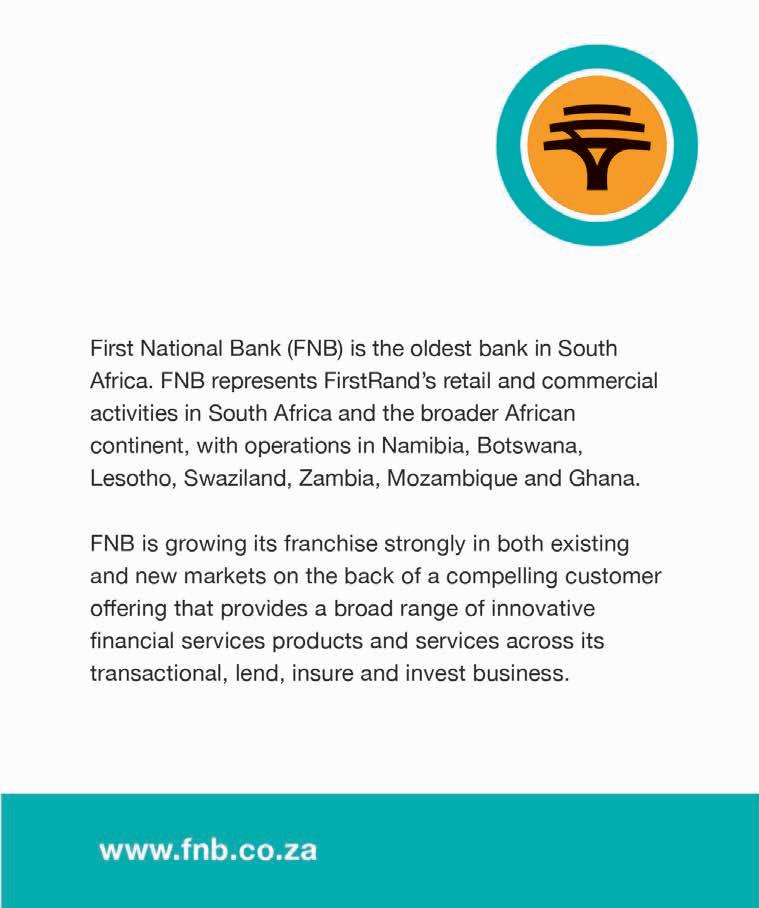
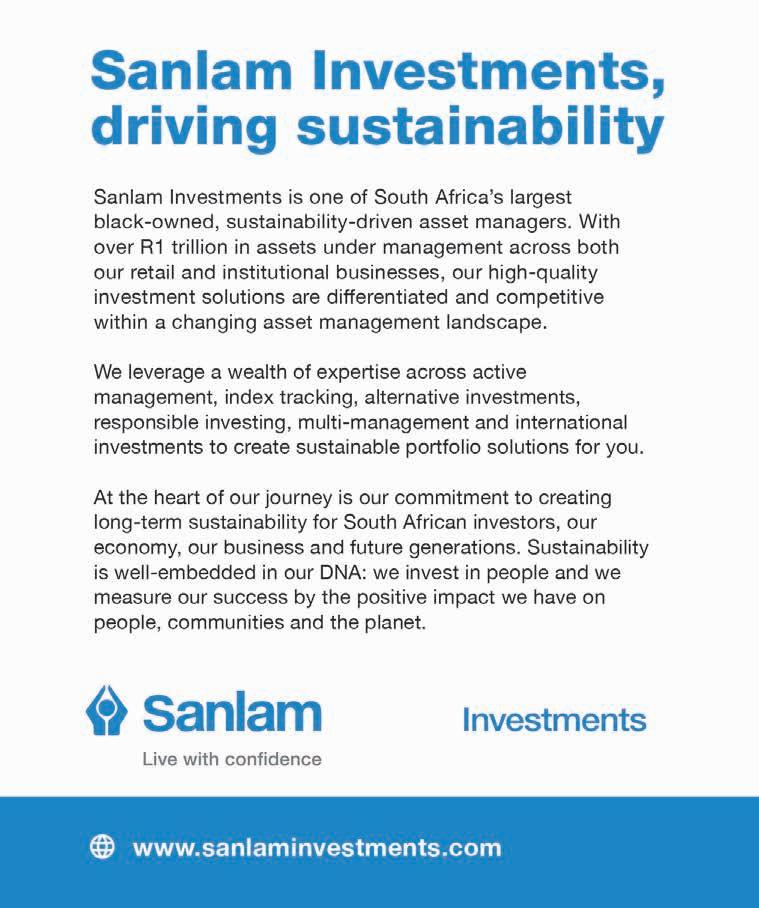
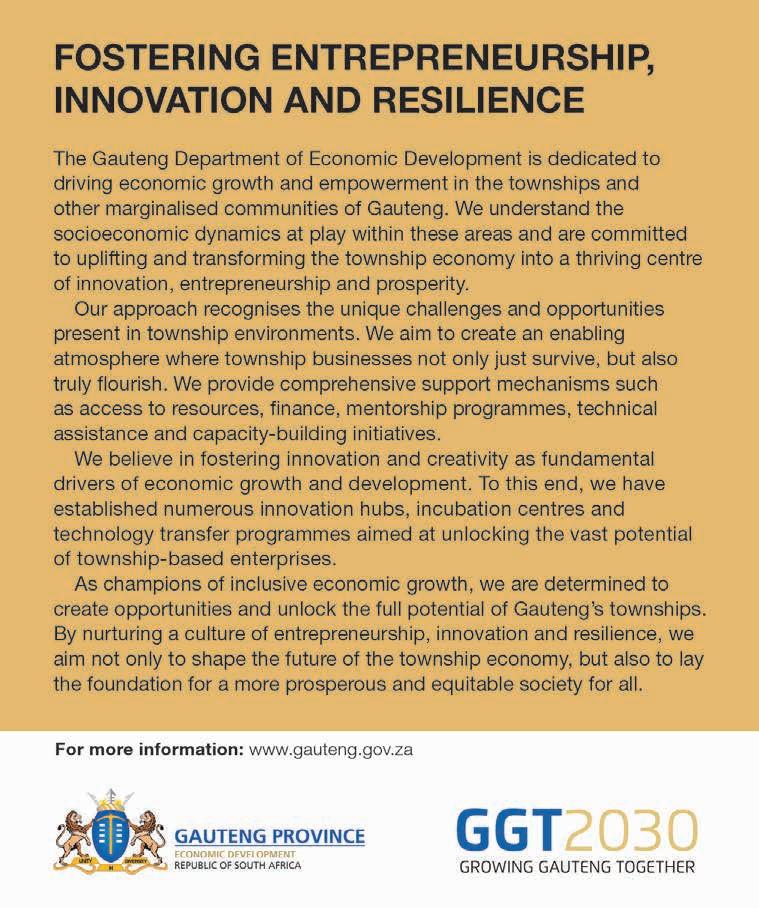
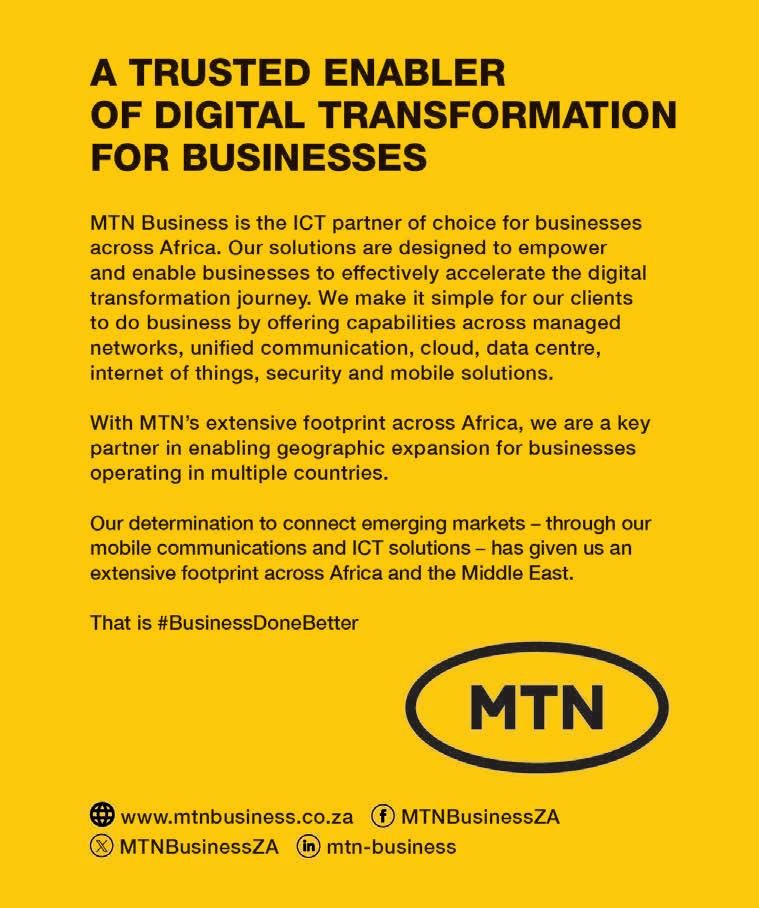


In 2003, former president Thabo Mbeki astutely observed that South Africa effectively operates under “two economies” without a connecting staircase bridging them. A powerful, urbanised and thriving economy (“upper floor”) is built atop a sprawling, marginalised economy (“lower floor”), which continues to struggle, comprising settlements, townships and rural areas. This division echoes the spatial and economic injustices of apartheid, with dire consequences for the long-term prosperity of the country and the wellbeing of its people.

Contrary to the perception of these economies as separate entities, they are intertwined in a way that perpetuates primitive accumulation and extractive capitalism, deeply entrenched in South Africa’s history. The upper echelon, with its old-age monopolies and indifferent captains, controls capital, manufacturing and essential institutions for a sophisticated capitalist economy. This control allows old capital to dictate the terms of output and social outcomes, further entrenching the economic divide.
Drawing from dependency theory, those relegated to the lower floor are characterised by structural dependence on the advanced economy for survival and viability. They consume goods and provide cheaper labour at a significant discount, often without meaningful ownership stakes or control of factories and economic installations. Trillions of rands pass through these communities, yet most of that wealth flows outward, deepening inequality and leaving communities in a perpetual struggle. Despite the urgent need
The “township economy” concept merits careful analysis because it can easily perpetuate primitive accumulation and extractive capitalism, writes labour market expert SIYABONGA HADEBE
for social justice, progress since apartheid’s formal end has been tragically limited.
Post-apartheid elites actively collaborate with old capital to maintain the status quo. They are more preoccupied with assimilation into the existing power structures than with a transformative vision. Consequently, they have created conditions where individuals have to rely on rents and patronage as a pseudo-economic policy to facilitate the limited participation of the African majority in an unequal economy. This approach permanently places the black majority on the periphery of productive activity and ownership, leaving them to become economic spectators.
In this regard, the “township economy” concept merits careful consideration. While it represents a significant portion of South Africa’s economic activity, with an estimated value of R900-billion, there are concerns about its long-term sustainability. Oligopolies and dominant large players can act as a drain on resources if they are not required to reinvest in communities. Similarly, some informal businesses may be indirectly controlled by larger corporations or other players with resources, limiting opportunities for local entrepreneurs and stunting their progression up the value chain.
This highlights the need to shift away from a model that perpetuates dependence and towards one that fosters a more diverse and self-sustainable township economy. Bridging the existing divide requires the dismantling of complacency surrounding the status quo.
As Italian-American-British economist and academic Professor Mariana Mazzucato suggests, South Africa needs an “entrepreneurial state” to lead the way, as over-reliance on markets has not yielded progress in the last three decades.
The government strategy must empower communities to take charge of local economies. Giant companies must stop extracting wealth without reinvestment and focus on models that genuinely incubate local suppliers and integrate small businesses into value chains. This is about creating genuine economic agency, not just handouts. This approach entails supporting local manufacturing, skills transfer for value-added production and the creation of competitive localised economic clusters. It would involve breaking down large companies into smaller units to enable micro enterprises to compete on an equal footing. Government support is needed to help new entrants access finance, training and business support to empower entrepreneurs.
This is not just about social justice, but also unleashing South Africa’s true economic might. The entrepreneurial spirit within these undervalued communities is immense. An ideal model of the “township economy” should help break the mould, replace paternalism with partnership and fuel an economy grounded in dignity and opportunity for all.
THEY HAVE CREATED CONDITIONS WHERE INDIVIDUALS HAVE TO RELY ON RENTS AND PATRONAGE AS A PSEUDO-ECONOMIC POLICY TO FACILITATE THE LIMITED PARTICIPATION OF THE AFRICAN MAJORITY IN AN UNEQUAL ECONOMY.


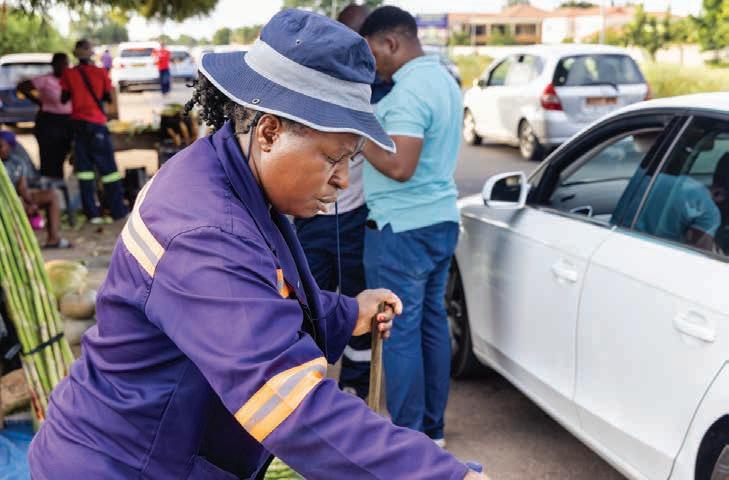
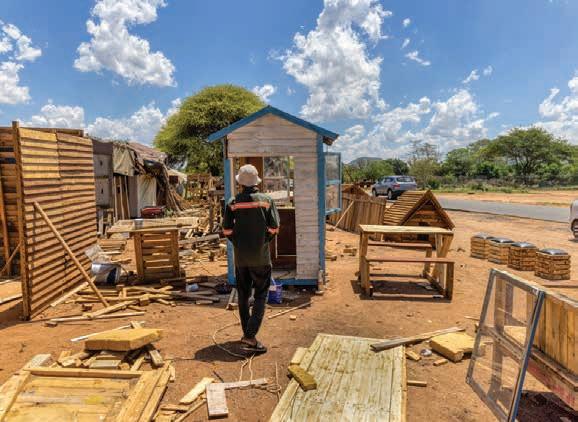

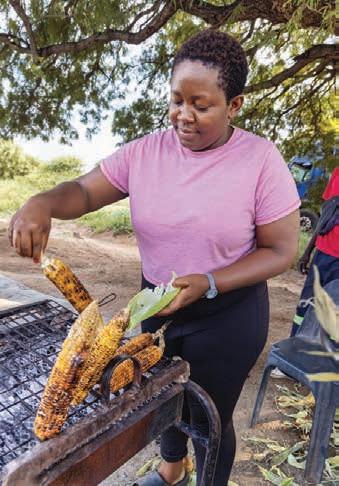
As the township economy becomes Gauteng’s new gold, the Township Economic Development Act seeks to formalise things, writes BUSANI MOYO
When Gauteng Premier Panyaza Lesufi presented the State of Province address in February 2023, he announced the legislature’s adoption of the Gauteng Township Economic Development Act. “We are of the strong view that our townships are our new gold. With new malls and petrol stations going up rapidly in our townships, we must ensure these investments benefit our people,” he said. It’s been over two years since the act was introduced, and it seems prudent to revisit it and ask whether it has had the intended impact.
 Panyaza Lesufi
Panyaza Lesufi
The economic challenges inherent in South African townships today did not come about by accident; they are a result of government policy that created these spaces as “dormitory” settlements. This means there was hardly any business happening in townships except for the most basic activities. In response to this reality, the Gauteng Township Economic Development Act’s preamble says that the provincial government “recognises that transforming the economy requires the significant participation and meaningful inclusion of people in areas of deprivation, prioritising ‘townships’ into the mainstream economy of the province, through their own enterprise that is supported by the government and big business”.
MUNICIPALITIES, BEING THE CLOSEST SPHERE OF GOVERNMENT TO THE PEOPLE, PLAY A PROFOUND ROLE IN ENSURING THE SUCCESS OF THE TOWNSHIP ECONOMIC DEVELOPMENT ACT.

The preamble also indicates that the provincial government recognises the need for measures to “assist, support and enhance enterprises while strengthening the principle approach of promoting economic transformation to enable meaningful participation of black people in the local township economy in the province”.
Specifically, the Gauteng Township Economic Development Act stipulates that the provisional government will spend two-fifths of its budget purchasing goods and services from township-based enterprises. In a recent article sponsored by the provincial government and published by Business Day, the provincial government indicates that the Act aims “to transform townships into fully-fledged commercial zones”. The same article cites Mathopane Masha, the Gauteng provincial government’s director for inclusive economy, who says that the provincial government anticipates that this will cut unemployment by two-thirds.

Phetogo Kubheka is the event director responsible for the transport and trade portfolio at dmg events, which hosts the annual Southern African International Trade Exhibition (SAITEX). The exhibition includes discussions covering the integration of the township economy, capacity-building with The Gauteng Enterprise Propeller, Small Enterprise Development Agency and Small Enterprise Finance Agency, cross-border opportunities and economic growth. Asked whether legislation such as the Township Economic Development Act is needed, Kubheka says the act “is essential to address the unique challenges of township economies, which are often marked by high levels of informal business activities and unemployment.” She adds: “The act aims to firstly formalise the current existing activities. It also seeks to unlock the economic potential of townships, reduce regulatory burdens and provide support and resources to small businesses and entrepreneurs, which ultimately
Another important aspect of the Gauteng Township Economic Development Act is that it seeks to make it easier for township businesses to get government funding. It accomplished this by cutting red tape. For instance, a recent article sponsored by the Gauteng Department of Economic Development reports that the act permits “municipalities to consider any township-based enterprise that requires written consent, licence, permission, registration or any other authorisation as being authorised to trade”.
Municipalities, being the closest sphere of government to the people, play a profound role in ensuring the success of the Township Economic Development Act. According to the act, municipalities can impose penalties and fines on vacant, underdeveloped land owned by private or public entities in townships identified by the Gauteng Spatial Development Framework for socioeconomic integration or economic consolidation. Whatever money will be obtained from such fines and penalties will be employed to meet the objectives of the act.
Asked whether the Gauteng Township Economic Development Act is having the intended impacts on township economies, Kubheka quickly responds: “Every journey has a starting point, ours is just beginning and the progress is visible,” and adds: “The township rental market programme is such an example.” She notes that this legislation is pivotal in formalising informal businesses and enabling access to governmental support and financial resources. Through this act, a special fund is in place to execute its mandate, and the eligibility criteria are drafted to accommodate its respective audience.
Kubheka believes that if properly executed long term, the act has the potential to “provide a framework for business development.” She says that through knowledge-sharing mentorship programmes, it will improve the skill sets within each sector. It will also assist in infrastructure improvements, which will result in scalability. This will help local businesses flourish and, in so doing, bring about a new set of business opportunities for the next generations.
It is hard to dispute that the Gauteng Township Economic Development Act’s aims are noble, but what progress has been made since its introduction in 2022? According to Masha, progress was noted within six months of the act’s introduction. He says: “There are certain things the bill prescribed that must happen within six months of it becoming an act.” Masha suggests that one of the main requirements that the provincial government already met within six months of promulgating the act was gazetting township enterprise zones. According to the act, within these zones, participants in the township economy can access benefits that include dedicated programmes, tax incentives, funding and procurement. The act also facilitates easier broadband installation to enable township-based internet service providers.
Kubheka believes that whether or not the Gauteng Township Economic Development Act will make a difference, “it’s about creating a self-sustaining environment in the long run”. She adds: “Progress takes time, but consistency in execution from all stakeholders is key.”
While she supports the need for legislation, such as the Gauteng Township Economic Development Act, Kubheka proposes that “the actual impact needs to be assessed through
THE ECONOMIC CHALLENGES INHERENT IN SOUTH AFRICAN TOWNSHIPS TODAY DID NOT COME ABOUT BY ACCIDENT; THEY ARE A RESULT OF GOVERNMENT POLICY THAT CREATED THESE SPACES AS “DORMITORY” SETTLEMENTS.
ongoing monitoring and evaluation of the economic performance of townships post-implementation at every stage, the increase in formalised businesses, and the job opportunities created”. She adds that stakeholders should “encourage private sector engagement in knowledge-sharing and investment within these communities”. Kubheka also suggests that showcasing the success stories and challenges will provide lessons for others, while the degree of stakeholder involvement will provide insights into the act’s effectiveness.
Notwithstanding legislation, such as the Gauteng Township Economic Development Act, the township economy’s success depends greatly on its integration with the global economy. Initiatives, such as the Southern African International Trade Exhibition (SAITEX), are one pathway through which participants in the township economy can benefit from global collaboration and participation. The 2023 edition was attended by over 4 300 participants and 160 exhibitors from more than 25 countries.
Exhibitions, such as the SAITEX, support legislation by strengthening township businesses by connecting them with networks of international and local businesses, allowing them to discover innovative products, solutions and other services tailored to their needs. The 2024 SAITEX takes place between 11 and 13 June and township economy participants can attend free workshops.


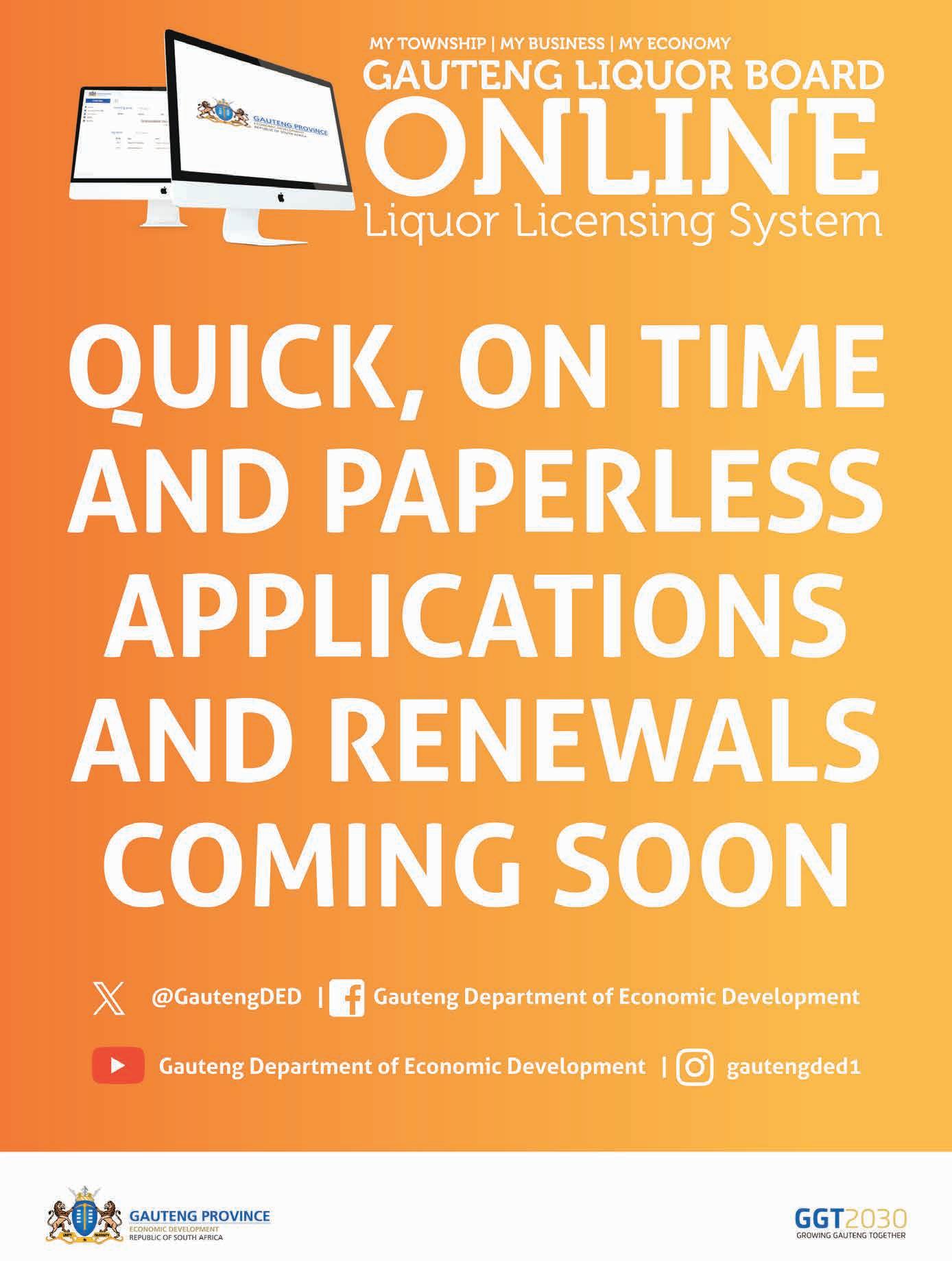
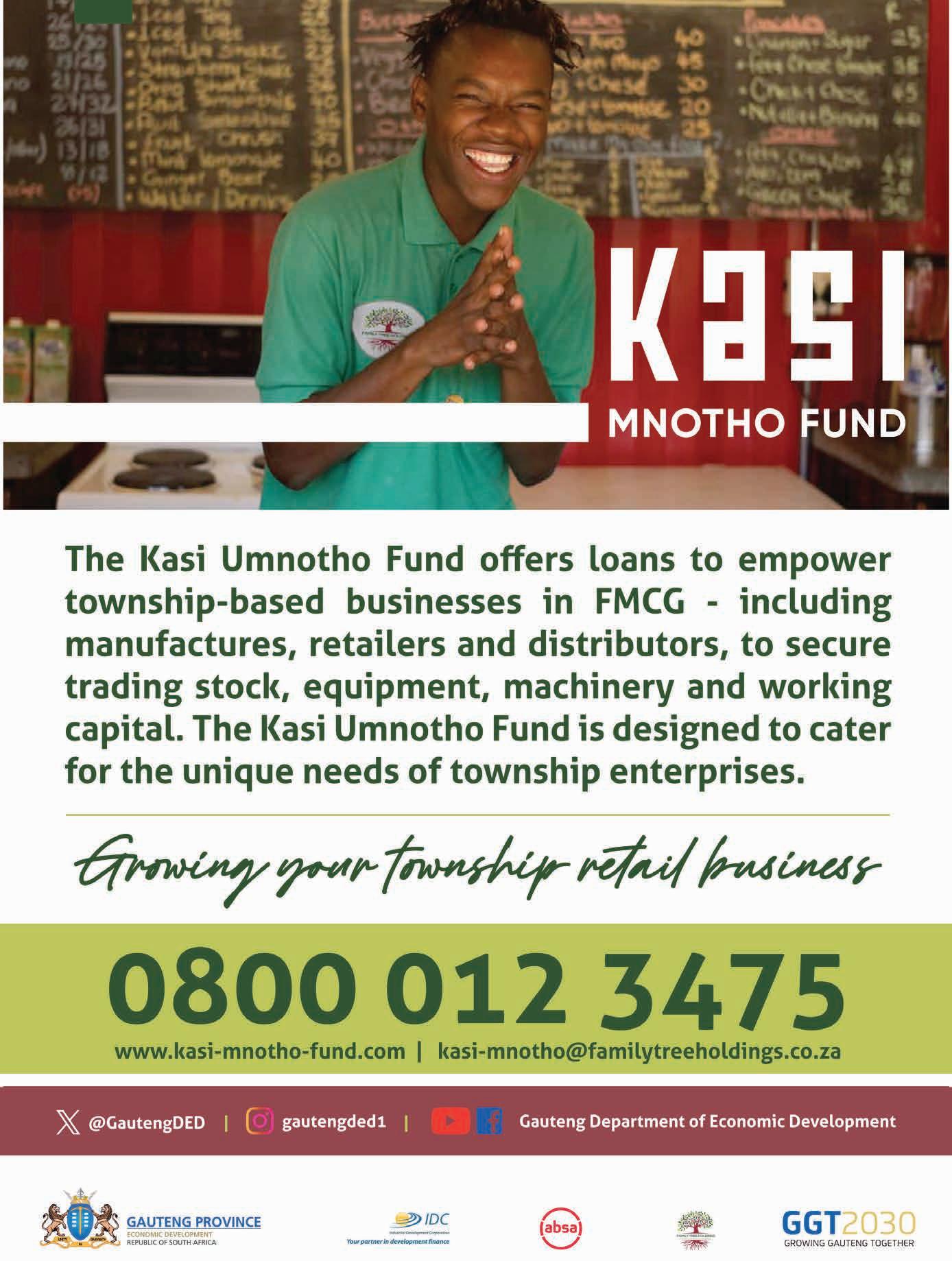
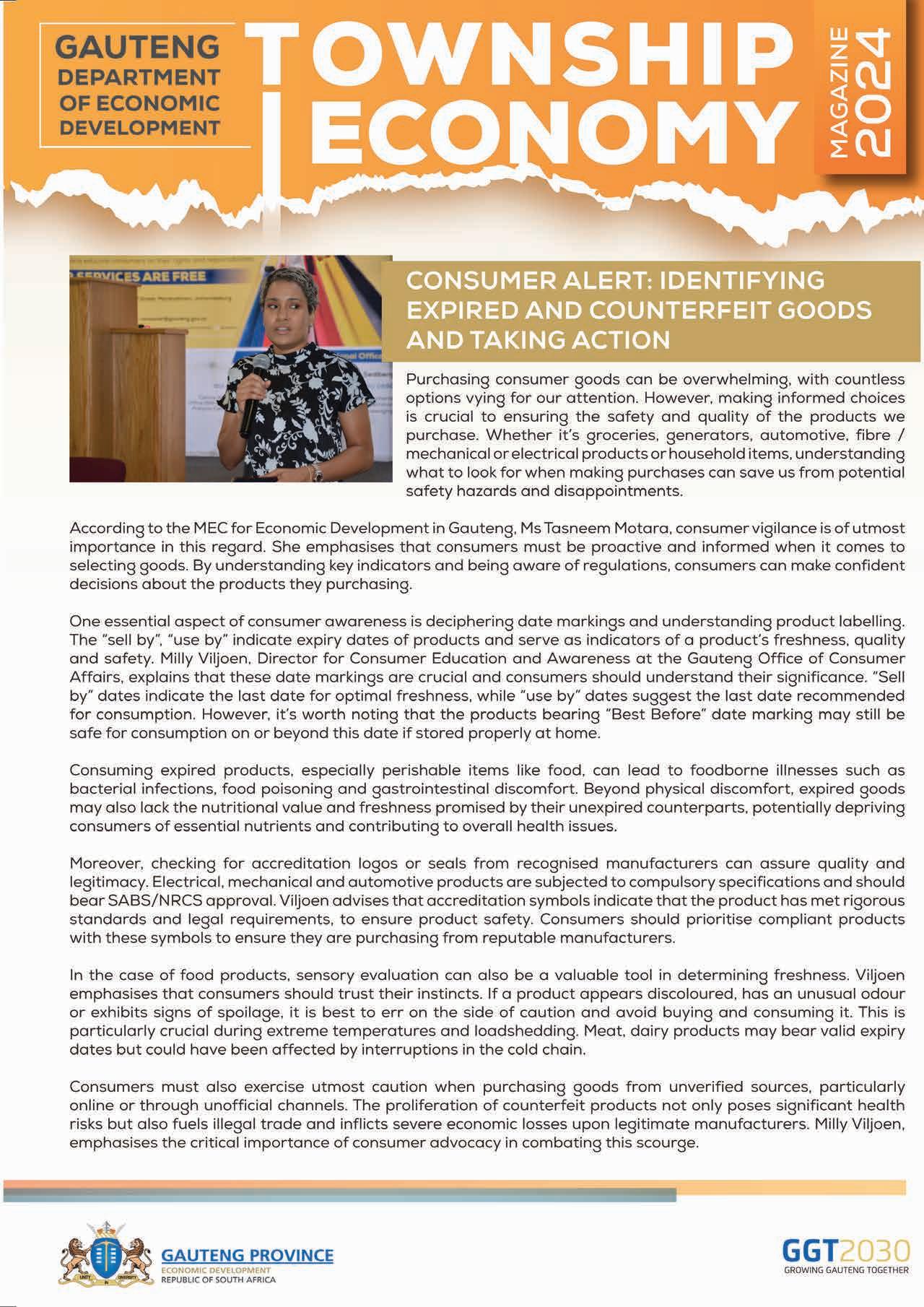
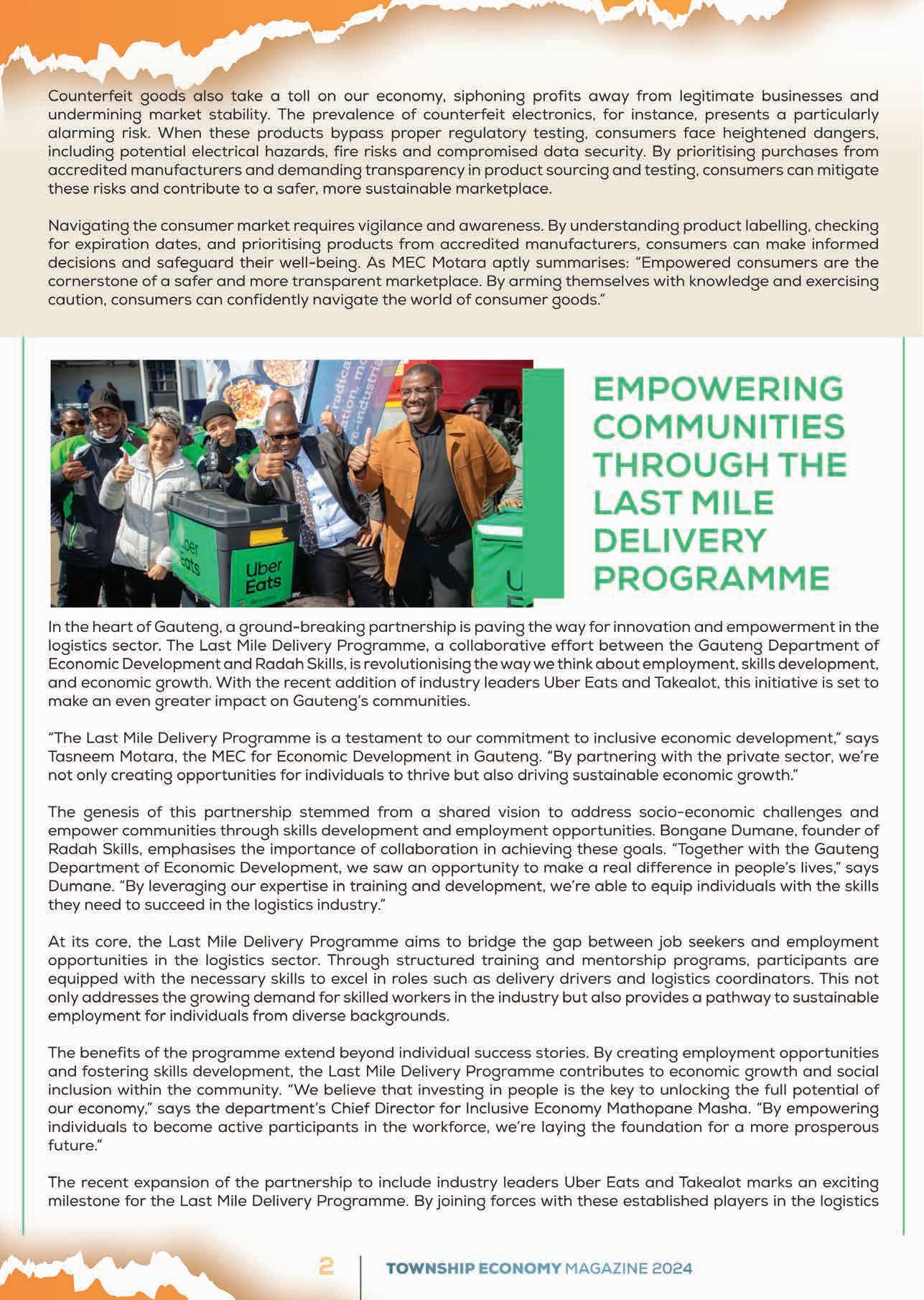
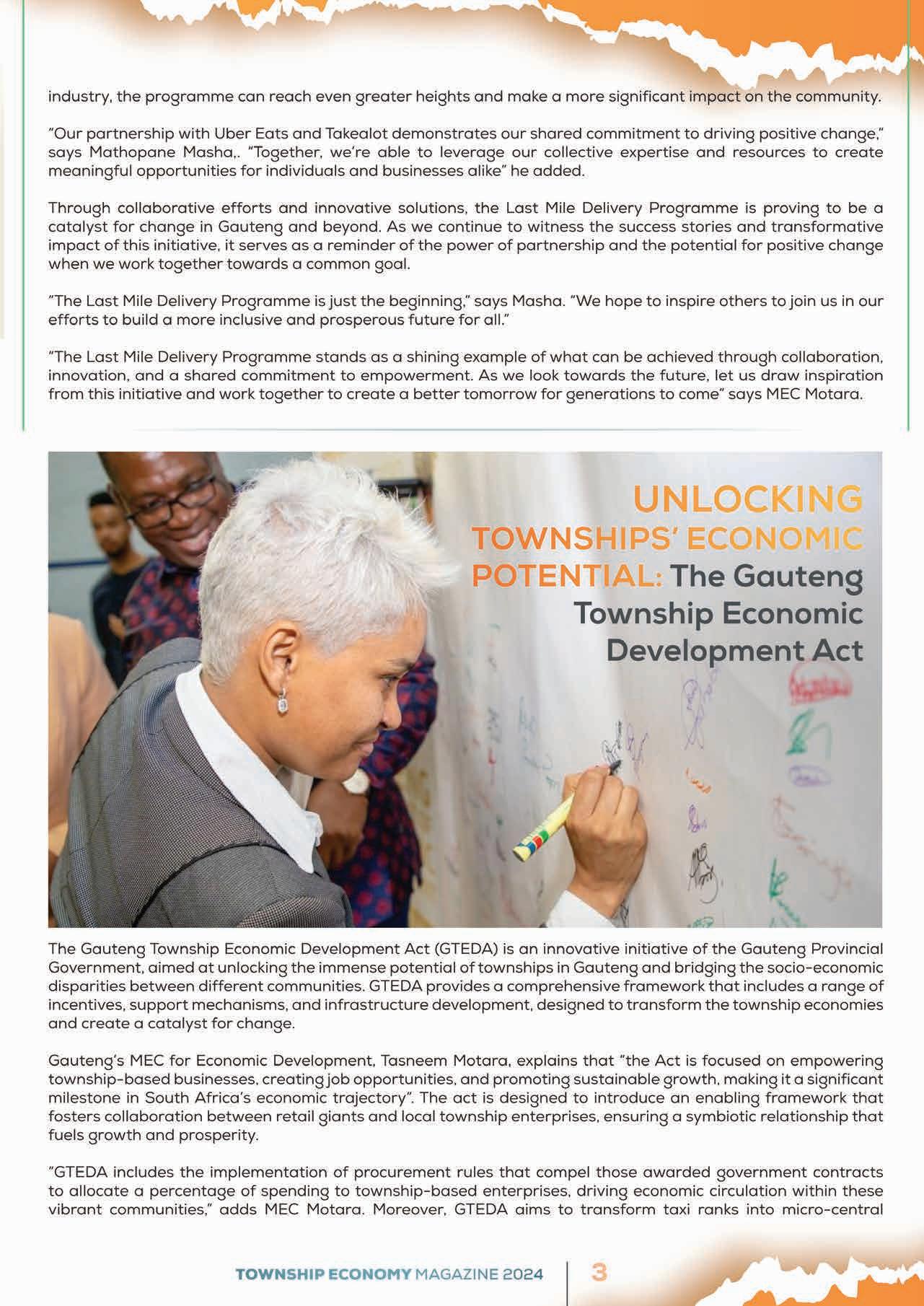
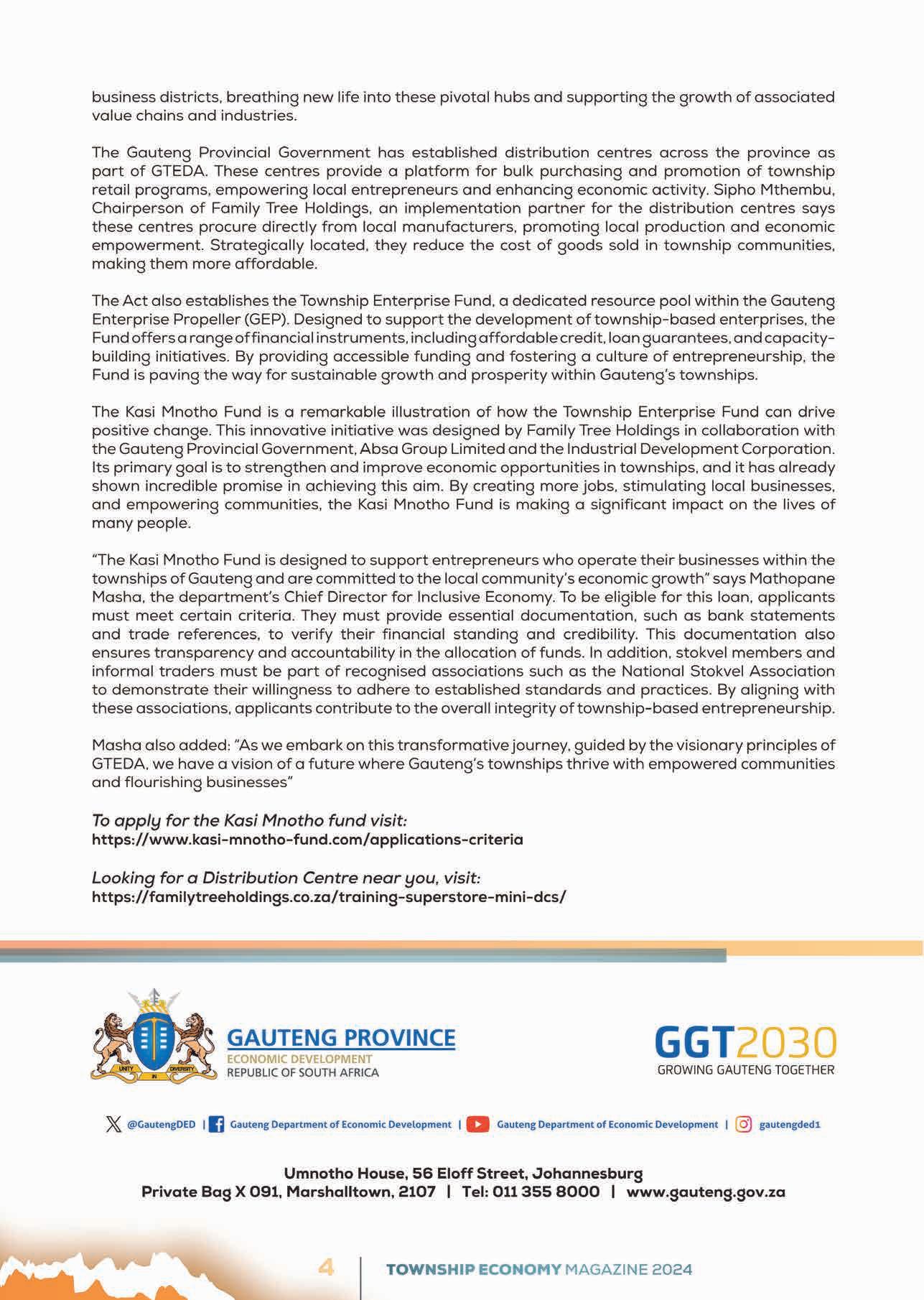

The township economy is on the rise, but its businesses are influenced by many of the trends and challenges affecting their larger, more established counterparts, writes LISA WITEPSKI
Just in case you haven’t been to the township recently, Bogosi Motshegwa, chief strategist and founder of strategy consultancy Thinkeneur, has some news for you: “Gone are the days when a spaza shop was the only way people in townships could run the township economy.”
Statistics by First National Bank, published in 2023, bear this: estimates hold that between 800 000 and one million businesses operate in South Africa’s townships. While street vendors and pavement sellers make up part of this figure, so, too, do larger businesses. “These businesses are really just a microcosm of South Africa’s larger economy, so while they may take on slightly different iterations of more established companies, they are affected by the same issues,” says Sherrie Donaldson of business consulting firm African Innovators.

Those who succeed in township businesses know that the greater global trends also affect their businesses. For example, as economic times get tougher globally, people in townships buy less. “Obviously, people don’t stop buying things altogether. But the quantum of what they buy changes – they go for cheaper options,” explains Donaldson. Of course, some products will always be in demand, no matter what the economy is doing. Donaldson says that people selling items such as cigarettes, coffee and Coke – “goods people usually buy without first checking the price” – have a measure of protection. “If you’re dealing in these, you generally have a buffer,” she maintains.
“BUSINESS OWNERS MUST BE OPEN TO LEARNING, ADAPTING AND EVOLVING. NO BUSINESS IS EVER THE SAME FROM IDEATION TO EXISTENCE.”–BOGOSI MOTSHEGWA
Another interesting trend in the mainstream economy is the impact of artificial intelligence (AI) and other technologies. So, canny vendors are investigating ways to harness AI and machine learning in their operations. Many other South African companies are developing software specifically for the country’s context.
Motshegwa comments on another way AI is being harnessed: “A lot of time can be saved by simply automating certain processes that take time, effort, energy and resources to complete or implement.”

Staying in the digital realm, it’s perhaps not surprising that social media plays a critical role in shaping the landscape. The key word here, according to Donaldson, is “storytelling” – and it’s a game-changer for small township businesses. With social media, the fact that a company cannot afford a costly TV commercial is no longer an issue. Donaldson adds that many companies are using WhatsApp as a marketing tool. “In Hammanskraal, for instance, last mile delivery company Delivery Ka Speed has developed its own app, and communicates via WhatsApp with clients – useful because in some townships, homes don’t have formal addresses.” Connectivity, in terms of data and fibre, facilitates this trend and will likely create more opportunities for township businesses.
That said, Motshegwa insists that while the online world cannot be ignored, neither can offline audiences. “It’s not online versus offline – it’s both,” he says. He adds: “AI and related technologies are blurring the lines between the two worlds at a rapid pace, but being able to maintain a balance between the two gives you a competitive advantage.”
Some patterns or issues currently affecting township businesses can’t really be considered “trends”, says Motshegwa, due to their evergreen nature. Take understanding the customer, for example – a concept he maintains is “one of the most under-rated and
“COLLABORATION IS ALSO KEY. ONE PERSON CANNOT DO EVERYTHING. DO WHAT YOU’RE GOOD AT, THEN TRY TO FIND A PARTNER WITH COMPLEMENTARY STRENGTHS, AND FIND A WAY TO MAKE MONEY TOGETHER.” – SHERRIE DONALDSON
ever-present concerns for a business”.
“A profitable business has a healthy conversation with a wide base of customers it serves consistently – yet most business owners spend their time working to design and produce products without consulting them,” adds Motshegwa. Research is, therefore, critical for success.
Motshegwa says business owners must be open to learning, adapting and evolving. “No business is ever the same from ideation to existence.” He argues: “Facebook started as a Harvard newsletter and networking platform and, as the social network gained popularity outside the Harvard dorm room, the founders had to adjust their objectives, vision and business.” He notes: “It is not the initial idea that makes a business successful, but rather the ability to evolve that improves the quality of the idea – so you must constantly look to iterate and improve. Every day is an opportunity to add something new or subtract something old to make the business better.”
Donaldson points to the need for township businesses to implement better governance, especially as they grow. “For most small business owners, it’s difficult to formalise completely – but you can still make changes, such as setting up separate business and personal bank accounts,” she advises. Donaldson adds that collaboration is also key. “One person cannot do everything. Do what you’re good at, then try to find a partner with complementary strengths, and find a way to make money together.”
As much as business owners need to heed how the world around them changes, Motshegwa issues a warning: “Don’t try to follow fleeting trends. Rather, aim to address core human needs.” He notes: “Some factors never change – people will always need shelter, safety, love and belonging, even if these needs
WHILE TRADITIONAL MALLS ARE BATTLING EMPTY SPACES, THIS DOESN’T SEEM TO BE THE CASE IN THE TOWNSHIPS – POSSIBLY BECAUSE OF THE TOWNSHIP ECONOMY’S GROWTH.
evolve. Therefore, If you find a way to meet these needs, your business – and your brand –will always be on trend.”
Suppose the township economy is, as Donaldson says, a microcosm of the broader economy. In that case, it stands to reason that there is a growing appetite for a great many different services. “We’re seeing demand for fashion brands, especially those that focus specifically on the township market,” she says. Drip and Bathu stand out as brands with an authentic story, successfully transitioning into the mainstream economy.
Donaldson says the property market is also booming, with the retail property sector performing especially well. While traditional malls are battling empty spaces, this doesn’t seem to be the case in the townships – possibly because of the township economy’s growth. She predicts that demand for property in the townships will continue to grow, along with demand for infrastructure such as water, electricity and solar.
For Motshegwa, the question of fast-growing township businesses is less simple. It cannot be answered until a hard and fast definition of a township business is available. “Here’s why this clarification is important: the townships usually see ‘growth’ in development when property owners build shopping or strip malls,” he explains. He adds: “Most shops occupying these spaces are not owned by township people, but they make much money.” Motshegwa poses an important question: “For example, Shoprite is the biggest retailer in my hood and makes more money than many smaller businesses combined – but does it qualify as a township business?”
Although the success of larger businesses may not contribute directly to wealth creation for township residents, Motshegwa cheers the fact that more and more young black entrepreneurs are gaining ground in different categories and industries, breaking the mould of what township business owners produce and sell.
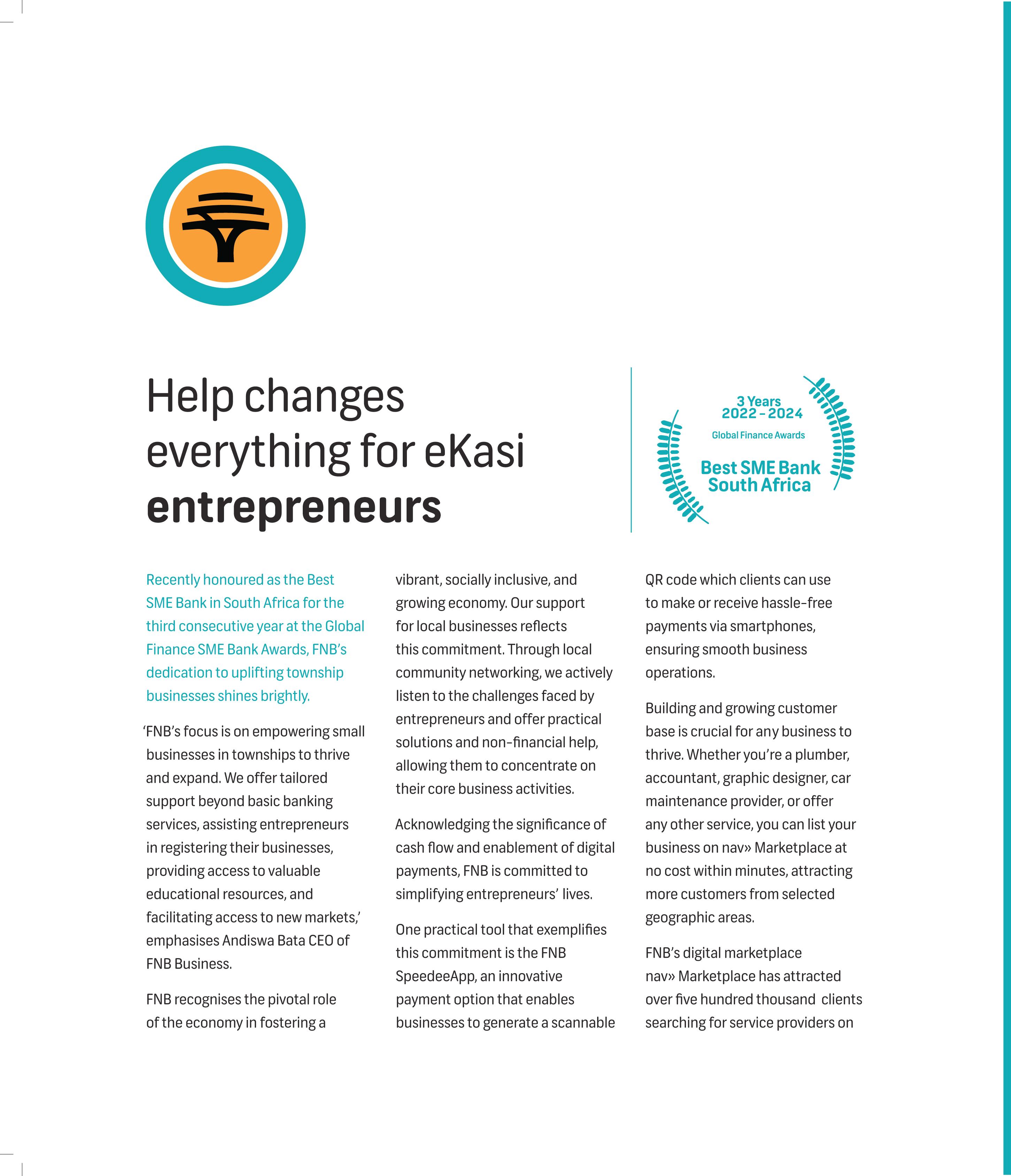
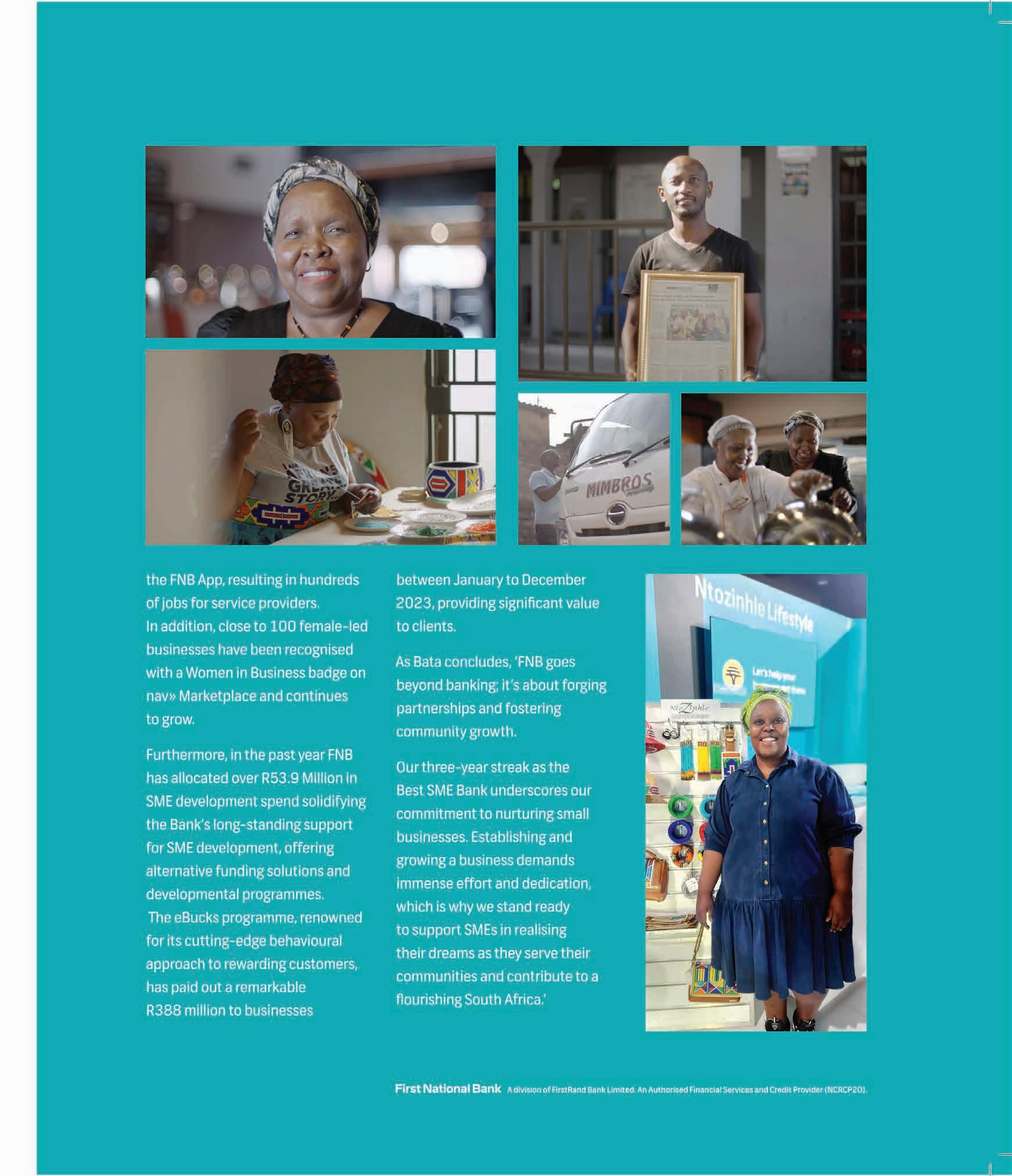
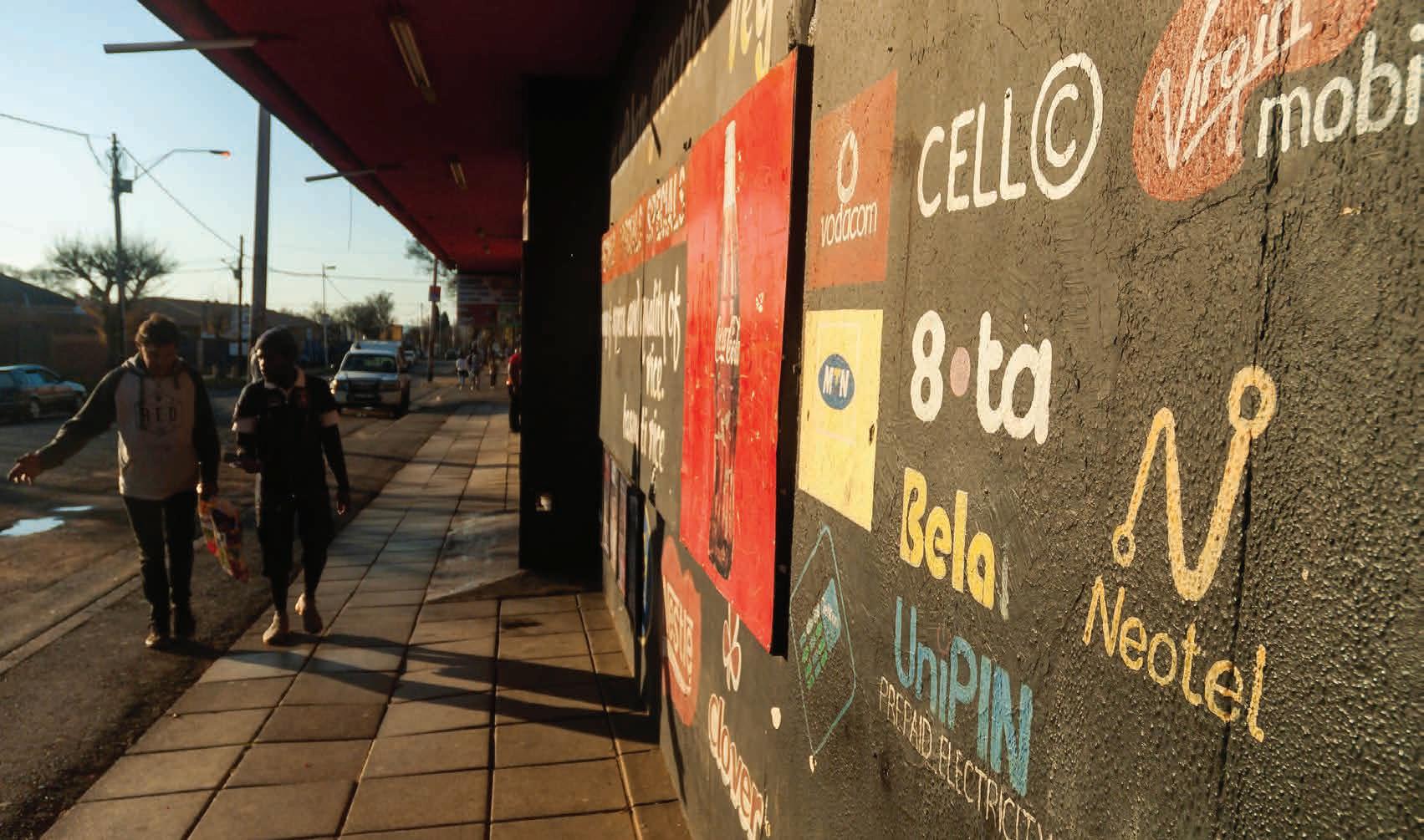

The so-called kasi economy is driven by micro enterprises across multiple sectors. RODNEY WEIDEMANN looks at the growth of this market and its potential impact on the broader South African economy
he 2021 South African census indicated that some 24.35 per cent of the country’s population lives in townships. This means these vibrant and innovative communities are home to 11.6 million people, indicating that townships represent billions of rands in spending power.
The kasi economy is almost circular, with businesses created by residents and supported by their fellow township citizens. The Township CX Report 2023 shows that township residents prefer to shop close to where they live, with 23 per cent of survey respondents saying they spend 25 to 50 per cent of their income in the townships. A further 25 per cent of respondents say they spend more than 50 per cent of their earnings in the townships.
This is, at least, partly driven by rising food prices – albeit that food price inflation has dropped significantly over the past year, from a 14-year high of 13.4 per cent in January 2023 to the current 7 per cent in January 2024, according to CPI data from Statistics SA – with residents still keen to stretch their rands by buying smaller items closer to home, rather than spending on travel to shop.
This has opened the door for a growing number of micro enterprises to be created and fully operated by township dwellers themselves, delivering much-needed paid-for services and products. In this article, we break down six key market segments within the kasi economy, considering their impact and potential for growth.
THE TOWNSHIPCXREPORT NOTES THAT SPAZA SHOPS ARE AN ESSENTIAL PART OF THE TOWNSHIP ECONOMY, PROVIDING GOODS AND SERVICES TO RESIDENTS.
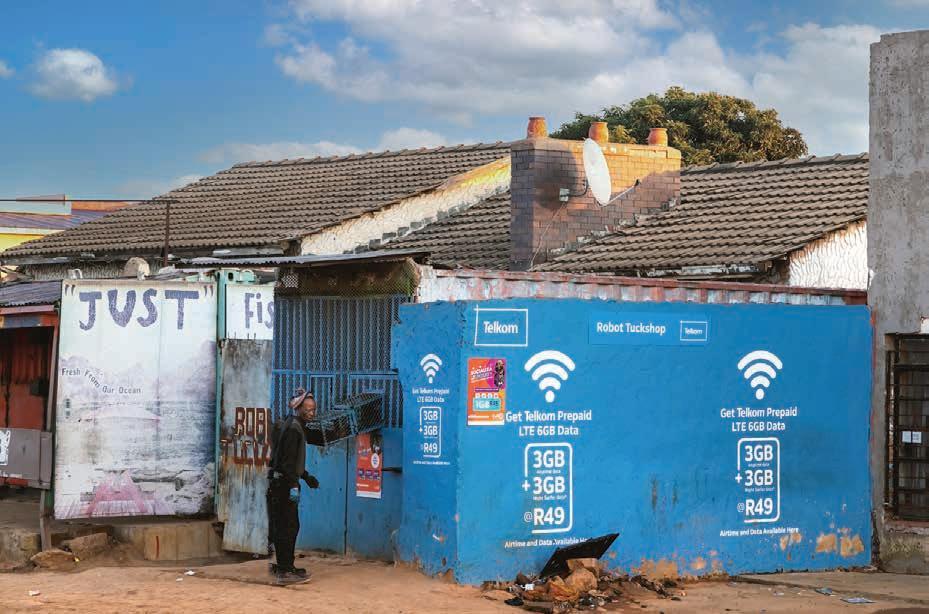

The Township CX Report notes that spaza shops are an essential part of the township economy, providing goods and services to residents, indicating that there are approximately 200 000 spaza shops in South Africa – the majority located in townships.
The study also found that more than 54 per cent of respondents said they have bought products that were repackaged outside of their original packaging (by spaza owners), partly demonstrating the trust between consumers and spaza owners, as well as customers’ search for value.
Karabo Mamabolo, through-the-line strategist at marketing agency Matte BLK, points out that spaza shops contribute to the economy in the sense that they help people save money, both in terms of their relative pricing compared to large retailers and by saving money that otherwise might have been spent travelling to a mall.
“However, more broadly economically, there is less impact from this sector, as spazas are
predominantly owned by foreign nationals. This has positives and negatives. On the one hand, locals lose out on opportunities to open their own shops due to the rapid proliferation of foreign-owned ones. However, on the other hand, it does provide easy access to such shops for residents, with one available on every other corner,” he explains.
“I do believe there is plenty of scope for corporates to assist in empowering businesses within the township economy. A key issue preventing people from opening their own businesses is a lack of financial literacy.
“If corporates recognise the brand value of providing such skills they can contribute to formalising the kasi economy and ensuring that everyone has an equal opportunity to compete in the market itself.”
There is little doubt that shebeens and fast-food restaurants benefit both the township economy and the broader national one. Mamabolo suggests that it is a thriving market and a massive segment within the township economy as a whole.
“Shebeens, in particular, are leaders in demonstrating how national brands can formalise
“THERE IS PLENTY OF SCOPE FOR CORPORATES TO ASSIST IN EMPOWERING BUSINESSES WITHIN THE TOWNSHIP ECONOMY. A KEY ISSUE PREVENTING PEOPLE FROM OPENING THEIR OWN BUSINESSES IS A LACK OF FINANCIAL LITERACY.” – KARABO MAMABOLO
• With increased Internet access, people are finding and creating more opportunities for themselves online. Internet access has a snowball effect with positive outcomes.
• A cellphone with an active internet connection enables participation in the gig economy.
Source: Township CX Report 2023
partnerships and assist shebeens to grow their clientele and reputation. Through effective branding, coupled with efforts to make the shebeen itself look like an environment where people want to enjoy a drink, large brands can assist these small businesses to grow to a new level.
“This type of collaboration can, in turn, lead to many other positive spin-offs, as these national brands can leverage their initial shebeen sponsorships into broader, more community-related ones, such as social, cultural and sports-related benefits,” Mamabolo says.
Setlogane Manchidi, head of CSI at Investec, explains that a thriving township economy is very important to South Africa’s recovery as our poor-performing economy has led to high job losses.
“The township economy provides a possible solution

Mamabolo suggests that this kasi sector is one of the biggest business opportunities in townships as this is a high-demand market that is growing continuously.
Remember, we are seeing a huge shift of people coming to the urban areas – generally seeking employment – from rural ones. So, if someone has a house where they can rent out a room, they can often make enough to look after their family and even potentially save money to invest in other business opportunities.
“This is an ideal way to grow the township economy – having people earning enough money to invest in other opportunities. There is definite growth in the economy in this sector.”
Mamabolo notes that, as an observer, he feels government has a role to play here in assisting this sector. “Let’s create a space where we can regulate these dwellings, ensure the living conditions are right, and bring them more into the formal economy,” he adds. “This will boost the broader South African economy and open up indirect routes for additional job creation.”
Manchidi backs this up, saying that there is a crying need for entrepreneurs who not only succeed, but also have the ability to impact positively and transform their communities and broader society.
“We are a country beset by many socioeconomic challenges, but these very challenges also present opportunities for entrepreneurially minded people to add value by designing and delivering innovative solutions. Entrepreneurs should seek to solve problems, meet needs and ease pain points through their products or services.
“People’s active economic participation has such a positive effect on them, their communities and society. People who are active economically quickly realise a sense of worth, contribution, dignity and direction, offering them a better chance of occupying their rightful place in society,” he explains.
Unlike the growing backroom rental space, this is one of the most informal segments in the township economy, says Mamabolo. Generally, he says, this sector comprises former employees of major automotive manufacturers who now run a small operation repairing vehicles, usually ones out of warranty, in their area.
“These mechanics are so informal that they are seldom registered as businesses. So, while they are good for the individuals, they have less impact on the broader economy. On the other hand, there is a level of ad hoc employment created in this market as these players sometimes have to call on help when repairing a car, so will usually bring in unemployed youngsters to assist them.
“However, this market seems to be dying slowly, mainly because of improved car payment plans that offer effective and cheap service plans. This means that many car owners now get their vehicles serviced professionally through these plans,” he continues. Nonetheless, he adds, there is still space in the market for such mechanics to service second-hand, older vehicle models. Asked what impact corporate brands might have on stimulating this sector, Mamabolo replies that although there are opportunities to build relationships with these players and help them formalise their businesses, there may be a lack of will, as these enterprises might view such mechanics as competition for their own business.

“We should, of course, encourage young people to look beyond traditional employment,” comments Manchidi, “and explore entrepreneurial opportunities that not only enable them to
become active economic participants, but also solve people’s pain points in the process.”
As a more formal industry sector, taxis contribute to the economy significantly – providing a cheap, convenient and always-available transport system. Furthermore, suggests Mamabolo, operating a taxi business is also quite easy.
“From a job creation perspective, to drive a taxi requires a valid driving licence and the attendant driving skills, plus a public driving permit. We have seen scenarios where youngsters who may have left school early, drive taxis for a living and use the money earned to either further their education or even to start their own taxi business,” he says. For entrepreneurs wishing to operate or own a taxi business, three permits are required – an operator’s permit, an owner’s permit and a driver’s permit.
“It is also an area ripe for partnerships with the formal sector. There are massive opportunities to be found in transit advertising, while there is also potential to gather data to help understand specific scenarios better. With better knowledge of people’s behaviours and shopping or spending patterns, we are in a better position to grow the country’s economy.”
AS A MORE FORMAL INDUSTRY SECTOR, TAXIS CONTRIBUTE TO THE ECONOMY SIGNIFICANTLY – PROVIDING A CHEAP, CONVENIENT AND ALWAYS-AVAILABLE TRANSPORT SYSTEM.

“THE REAL OPPORTUNITY IS FOR MANY YOUNG PEOPLE KEEN ON RUNNING BUSINESSES AS THE TOWNSHIP ECONOMY SERVES AS A LEARNING GROUND TO CREATE AND GROW OPERATIONS THAT CAN MOVE BEYOND THE TOWNSHIP.” –SETLOGANE MANCHIDI
Manchidi suggests that this is a great industry for entrepreneurs who are, by nature and definition, job creators, as opposed to job seekers.
“The simple translation is that when we support an entrepreneur, there is one less job seeker in the economy, and these entrepreneurs have the potential to provide employment for multiple other job seekers. This prospect excites me, because it means through entrepreneurship, we can create the ability for others to also become active economic participants,” he adds.
Mamabolo notes that the nature of taxis as a cheap, easy form of transport means that people in the township will likely continue to use them.
“Remember that although Uber and similar ride-sharing businesses have proliferated, the price points between this service and a taxi operation are quite different. Furthermore, some residents in townships do not yet own smartphones, which makes it impossible to download the ride-share application,” he explains.
When it comes to barbers and hair salons, Mamabolo continues, this is also a relatively small segment within the kasi economy. He explains that this is due to many residents adopting a DIY approach to their hair and choosing to cut it themselves.
“This is quite a small contributor to the economy, but it doesn’t mean there aren’t opportunities for brands within this space to collaborate with individuals – influencers, for example, who may post videos online of hairdos they have completed.”
Hair and beauty brands can collaborate with these small businesses, and by helping with things, such as upskilling, formalising these businesses, and maybe even implementing some infrastructure for them, they can help stimulate and grow this environment,” Mamabolo points out.

“Remember, opportunities create demand,” he continues, explaining that by partnering with township salons and barbers, running training workshops and equipping these businesses better, large brands will make this a more attractive arena for those starting up while also boosting the South African economy.
Manchidi points out that it is clear that, as the digital economy takes an increasing hold in the townships, it will present even more opportunities for entrepreneurial activity.
“We can expect growing numbers of township-based entrepreneurs to begin utilising technology as a way to differentiate themselves and their businesses.
“Given the sheer number of people who continue to live in townships, I think the township economy will remain somewhat resilient. At the same time,
given how challenged townships are in terms of service delivery, infrastructure and poor connectivity, I think a lot more can be done by government and corporates to tap into the true value of the township economy,” he states.
Mamabolo agrees, claiming that it is vitally important to try and formalise more of these businesses.
“A formalised business is better positioned to develop stronger relationships with other players in the market and has a better chance to grow and develop. Furthermore, a formalised business also has structures it can call on to assist in an emergency.
“Ultimately, it’s about ensuring these micro enterprises can access the tools, education and assistance they need to grow and begin employing others. This will not only be a significant boost to the township economy, but will also help the national economy to begin flourishing,” he concludes.
“WE ARE A COUNTRY BESET BY MANY SOCIOECONOMIC CHALLENGES, BUT THESE VERY CHALLENGES ALSO PRESENT OPPORTUNITIES FOR ENTREPRENEURIALLY MINDED PEOPLE TO ADD VALUE BY DESIGNING AND DELIVERING INNOVATIVE SOLUTIONS.” –
A beneficiary of the MULTICHOICE Africa Accelerator shares the learnings from his entrepreneurial journey to establish a tech company
While progress has been made, the unemployment rate in South Africa remains above pre-pandemic levels, emphasising the need for continued economic growth and entrepreneurship opportunities. Entrepreneurs, such as Thulani Masebenza, co-founder of Moya Money, a beneficiary of the MultiChoice Africa Accelerator, are critical to increasing job creation.
Masebenza reflects on his experiences starting a 10 per cent black-owned tech company in 2021.
With his partner Sabica Pardesi, Moya Money was established to help businesses facilitate and manage the payment between them and the freelancers they work with.
“Our mission is making self-employment sustainable for 100 million Africans who earn their own income and the businesses who pay them,” Masebenza says. Moya Money is a web app that provides businesses with a solution that simplifies their workflow and a mobile app that simplifies payments for freelancers.
Masebenza shares five things young entrepreneurs must consider before venturing into business:
1.
When you have a business idea bubbling in your head, instead of acting on it immediately and doing all that work, think through who you’re going to need to work with to deliver on that big picture vision you have in your mind,” advises Masebenza.
Often, entrepreneurs hop onto podcasts or give keynote speeches and preach the importance of having a solution, and unique idea as the most important step to starting a successful enterprise. Although the idea is
crucial, another component is just as criticall to consider before fleshing out the idea –selecting the right business partner.
For Masebenza, it matters not that you have a groundbreaking concept that’s never been done before if you are not surrounded by the right person(s) to help you solidify the idea. The process of selecting the “who” you embark on this journey with extends beyond, just the business partners or co-founder, and includes the team you employ, the investors and the customer.
“The customer segments you choose are really important because serving the wrong customer can be detrimental to the growth of your business,” he says.
When selecting the right partner(s) and team, Masebenzi lists the following traits as essential:
• A compatible work ethic.
• Personalities that gel well together.
• Honesty.
• People who are smart and have good communication skills.
He ends by stressing the importance of a diverse team that is inclusive of people of different genders, sexual orientations, and races who will provide different perspectives.
2.PREPARATION MATTERS
“Always be overprepared if you want to play to win.” Only one person must make it a prerogative to know the business inside-and-out, and that is its founder. As an entrepreneur, you will have many interactions with potential funders or clients who will always want to know what your product or service is about – you must be prepared to answer both the basic questions and
THE PROCESS OF SELECTING THE “WHO” YOU EMBARK ON THIS JOURNEY WITH EXTENDS BEYOND JUST THE BUSINESS PARTNERS OR CO-FOUNDER AND INCLUDES THE TEAM YOU EMPLOY, THE INVESTORS AND THE CUSTOMER.

the intricate ones. Your preparation for any meeting therefore must see a deep dive into your business and the market you are operating in, overthinking any and all talking points that may arise from your encounters.
SAMPLING ALLOWS YOUR CONSUMERS TO SEE THE VALUE OF THE PRODUCT/SERVICE FOR THEMSELVES AND, WHERE NEEDED, PROVIDE FEEDBACK BEFORE MAKING THE PURCHASE.

3.
“Let them try and they will buy.”
Many entrepreneurs hold their ideas in such high esteem that once the product/service is ready, they rush to get into trading and skip a key step: sampling. For Moya Money as a tech business, it was important to get the product to the clients first, before asking them to buy into it, allowing the product to speak for itself. Sampling allows your consumers to see the value of the product/service for themselves and, where needed, provide feedback before making the purchase
4.
“Pressure is a privilege, and it’s a privilege for those who earn it.”
The role of an entrepreneur comes with a plethora of responsibilities. Every decision made for the business rests heavily on your shoulders, and the accountability is largely yours to bear. As the founder of a business, you naturally fall into the role of leader and your team, investors and clients look to you for the success of the product/service.
It is this pressure that guides you into making ethical choices, such as guarding
customers’ data and responsible money flow within the business.
5.
“There’s no point entering a market if you’re just going to maintain the status quo.”
There is an unspoken expectation that any entrepreneur must believe in the value of their product/service more than anyone else. There are very few times, however, that one ventures into a market as a monopoly. Competition is rife and many markets are saturated, so your true value and unique selling point is a product/service that differentiates itself from your competitors through the quality it provides your customer.
It is natural for an entrepreneur to spend time studying their competitor, but it is equally as important to study the customers you serve. Spend time gathering information on what the customer wants. If quality for your customer means a cheaper solution or a better customer experience, then those are the factors that must be a driving force in the production of the goods/service you are providing as you aim to find a differentiator for yourself in the market



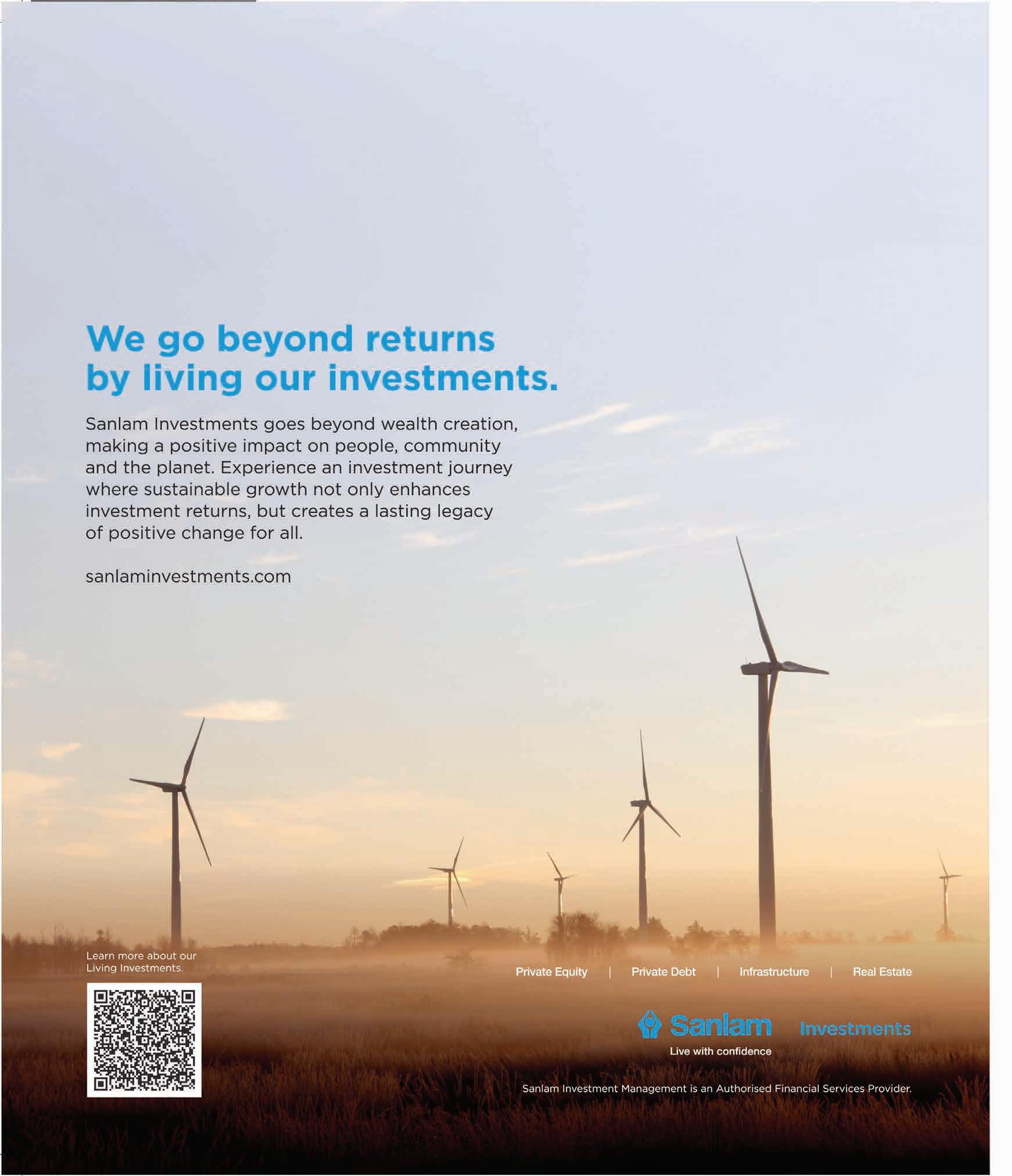
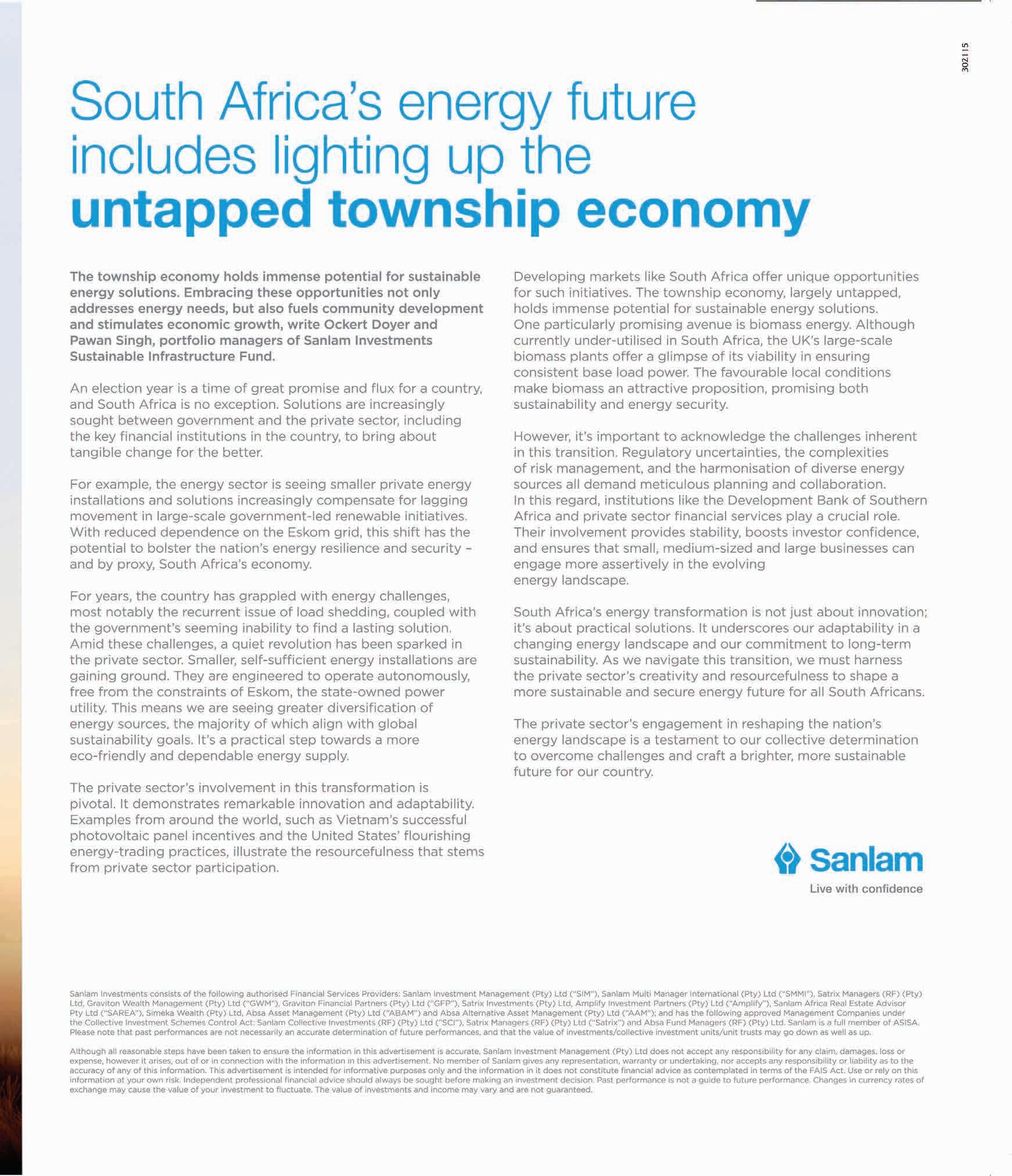
The Small Enterprise Development Agency’s Township and Rural Empowerment Programme is a boon to small businesses – if they follow the right processes, writes TREVOR CRIGHTON

The Small Enterprise Finance Agency (SEFA) operates – among other programmes – the Township and Rural Empowerment Programme (TREP), which supports informal, micro and small enterprises and cooperatives in rural and township economies. TREP provides blended finance and business development support to various sectors to promote their participation in the mainstream economy.
TREP supports all small enterprises operating in townships and rural areas that meet the qualifying criteria, including – but not limited to – clothing and textiles, bakeries and confectionaries, shisanyama and cooked food, retail, automotive, personal care and artisans.
Dr Mzukisi Jonathan Qobo, interim chairperson of the SEFA board, writes in the organisation’s 2023 annual report that SEFA approved loans to the value of R1.7-billion and disbursed R2.4-billion into the South African economy. This funding impacted 74 762 businesses and cooperatives that have created and sustained 104 547 jobs in the South African economy. TREP funding represented a R387 444 000 slice of that pie, with the Funding Connection’s funding strategist, Dagmar Breiling, indicating that TREP surpassed its target of supporting 20 000 enterprises by 3 344 and has set a target of 30 000 enterprises for 2024, with a budget of R909.42-million allocated for the programme.
TREP covers the cost of production inputs, working capital, assistance with compliance and technical skills improvement, business and financial management training and facilitating market access to a maximum of R1-million towards working capital, cost of equipment or any other capital expenditure, paid directly to the supplier where applicable. The funding is available in blended finance with a split between a loan and a grant to that maximum R1-million value. Breiling says TREP differs from other funds because of the various operational assistance it offers. “This impact is important for smaller businesses run by inexperienced business owners,” she says.

TREP SUPPORTS ALL SMALL ENTERPRISES OPERATING IN TOWNSHIPS AND RURAL AREAS THAT MEET THE QUALIFYING CRITERIA.
The two major TREP initiatives are the Spaza Shop Support Programme (SSP) and the Automotive Aftermarket (AA) Programme. The SSP offers a blend of grant and loan finance – to a limit of R15 000 – and is supported by Nedbank. In the 2022/2023 financial year, 4 936 disbursements were achieved.
The Automotive Aftermarket business support scheme supports and develops small and independent automotive aftermarket enterprises, including informal businesses located in townships and villages. The programme, in association with partner bank Absa, funded seven clients with the AA facility at a value of R6.9-million and created 81 sustainable jobs in the last financial year. The package is also blended, with a maximum loan of R1-million with a grant of 20 per cent, limited to R100 000 per client.
Township or rural-based entrepreneurs can apply for support, including funding, through a common application template available via the SEFA website or one of SEFA’s 53 branches and 52 co-location points across the country. There is an access process via SMMESA, but applicants can mail their form directly to SEFA via trep@sefa.org.za. The business owners must be South African nationals and must submit the required statutory documents, including CIPC documentation and proof of address.
The Funding Connection’s funding strategist, Dagmar Breiling, says the application process is always hard for smaller businesses since most do not have the required documentation. “Also, keep in mind there are hurdles for a reason – they act as quality filters.” She adds: “They prevent inadequate or fraudulent applications from receiving funding. I am sure we all agree that funding should support sustainable projects so having your adminin order is an indicator for the long-term viability of ventures.”
South Africa’s informal sector remains largely unbanked, but accessing cost-effective business banking options can help these businesses grow, writes
MasterCard’s Driving Financial Inclusion in South Africa’s Informal Economy: The Landscape at the Bottom of the Pyramid whitepaper estimates that South Africa’s informal sector comprises 3.3 million micro and informal businesses.
The same source reports that, by the end of 2022, only 25 per cent of the informal businesses surveyed had a business bank account, though as many as 45 per cent of operators had personal bank accounts. Many of them also used those personal accounts to operate their businesses, which has drawbacks.
Francinah Phalatsi, business development manager at FNB Commercial, says keeping personal finances separate from business accounts is very important: “It helps avoid confusion when managing your finances and those of your business, allowing you to accurately track personal and business income and expenses.”
Phalatsi says that separating personal and business finances improves efficiencies and enables business operators to keep detailed records that create a historical record of business activity, understand their business finances, such as inflows and outflows and trends related to specific items, and comply with regulatory requirements. She adds that separating accounts also helps present a professional image and makes applying for personal or business credit considerably easier.
Jenine Zachar, head of Value Propositions and Client Experience, Business and Commercial Banking at Standard Bank, lists other benefits, including reduced risk of cash theft, increased transparency and improved access to markets. Of the last point, Zachar says that a relationship banker
– Standard Bank provides this to businesses from R7 per month – can help township businesses access new markets and expand their customer base.
Accessing business banking accounts is cost-effective with various banks offering low-cost entry accounts to help businesses get established. FNB has two options: the First Business Zero Account (zero monthly fees for sole proprietor businesses with an annual turnover of up to R5-million) and the Gold Business Account, designed for any business and ideal for registered businesses. The former account can be opened on the FNB app or online within a few minutes using FNB’s “selfie” process to prove identity and verify the user.
“FNB Business products are full-value banking offerings that help you start, run and grow your business,” says Phalatsi. They include 24/7 support with a dedicated Gold Business Desk, eBucks rewards and access to a full range of insurance, credit and investment solutions.” She says it’s important to note that a business bank account is a gateway into many business-specific solutions, all catering to your business needs, spanning from small businesses to more sophisticated businesses operating within their local community.

Standard Bank’s low-cost Mymo Biz account helps businesses manage their finances. With a business debit card, they can purchase stock and sundries and save towards business goals with a free MarketLink Account. Standard Bank also offers merchant devices that facilitate safe and secure card payments, as well as the ability to buy and sell airtime and electricity vouchers and facilitate withdrawals.
Standard Bank business accounts give businesses access to a dedicated team of virtual bankers regardless of turnover, size and location and include BizConnect, a
resource hub for small, medium and micro enterprises that allows access to information, business templates and the ability to register business through CIPC. “There’s also an Enterprise Development offering for qualifying businesses. Our solutions give qualifying businesses access to funding with softer conditions. Over and above this, we provide business development support, which also includes mentoring and coaching,” says Zachar. She adds: “We also offer crowdfunding solutions and access to Thunkubate, our digital skills academy.”
The Young Women in Business Network (YWBN) received its mutual banking licence from the South African Reserve Bank’s Prudential Authority at the end of January 2024.
This licence allows YWBN to convert from a cooperative financial institution (CFI) to a mutual bank. Once it opens its doors, it will become the first women-owned bank in South Africa. It will also become the first black-women-owned bank and CFI to apply for and receive a mutual banking licence.
YWBN is owned, controlled and managed by women for women from various professions, businesses and industries, and is dedicated to the economic empowerment of women. Over the five years of operating as a CFI, YWBN grew from the minimum 200 members required to establish it formally to 589 members. In the same period, it was able to draw investments of R21-million in collected deposits. It averaged R195 000 in monthly revenue in its last reported financial year due mainly to an increase in membership, interest from loans, interest on liquid deposits, compulsory membership fees and contributions.
YWBN managing director Nthabeleng Likotsi said the organisation will now move forward, participating “fully and equally” in the financial services sector as a mutual bank. The granting of the licence enables YWBN to offer essential financial services to small businesses, with a particular emphasis on savings and loan products for cash needs – and it appears they will focus on the unbanked and underserved population particularly.
With the licence secured, the bank’s next steps are to build, raise capital, establish a network and lay the foundations required to serve its target market.
“FNB BUSINESS PRODUCTS ARE FULL-VALUE BANKING OFFERINGS THAT HELP YOU START, RUN AND GROW YOUR BUSINESS.” – FRANCINAH PHALATSI











The informal sector has a crucial role in the global economy, and it must be connected to government and corporates properly to create opportunities to collaborate, learn and grow, writes
BUSANI MOYOThe township economy can benefit from integration, capacity-building and collaboration with entities such as the Gauteng Enterprise Propeller (GEP), Small Enterprise Development Agency (SEDA), Small Enterprise Finance Agency (SEFA), and Southern African International Trade Exhibition (SAITEX). These connections are important for learning, cross-border opportunities and economic growth.
Dr Mthokozisi Tshuma, policy specialist on inclusive growth at the United Nations Development Programme, notes: “The government should partner with the private sector to implement support programmes and increase financial assistance” to small businesses. He adds: “In collaboration with the government, the private sector can revitalise decaying inner-city areas and implement mixed residential townships to facilitate adequate spatial planning.”
The issue of integrating the township economy has been on the government’s agenda for a long time. For instance, the Gauteng Township Economy Revitalisation Strategy recognises this aspect by noting that township enterprises “can be supported to secure community markets through the formation of consumer cooperatives incorporating spaza shops and others that will mobilise and organise community-buying power to procure and produce needed goods and services at competitive prices and good quality”. The strategy document adds: “Government is committed to ensuring that
linkages are established in the supply chain by connecting township enterprises with production networks that operate on a larger scale in the mainstream economy.”
Phetogo Kubheka, event director responsible for the transport and trade portfolio at dmg events, which hosts the annual Southern African International Trade Exhibition, comments: “Effectively connecting the informal sector with government and corporate entities requires a multifaceted approach that includes improving access to information across all platforms and interacting directly with community business owners. SAITEX offers a dynamic arena for businesses to showcase their offerings, creating vital links with industry leaders and potential investors. By bringing together a broad spectrum of stakeholders under one roof, it accentuates the crucial influence of such platforms in nurturing business prospects and propelling economic advancement, particularly in the small, medium and micro enterprises (SMMEs) and township sectors.”
Kubheka states: “SMMEs’ engagement in the global economy is essential for driving innovation, accessing new markets and fostering economic growth.” She adds: “SAITEX exemplifies how platforms can bridge the gap between local SMMEs and global opportunities, empowering them to thrive in an interconnected economic environment.”
To a large extent, the infrastructure Khubeka suggests above is already in South Africa. For
example, the Township Economy Partnership Fund supports Gauteng’s vulnerable small township businesses that would otherwise not be able to access funding from private funding institutions, government and other business support programmes. The fund is a partnership between the Industrial Development Corporation, GEP, and the Gauteng Department of Economic Development.
SEDA and SEFA are crucial in facilitating growth within the township economy. For instance, the Department of Trade and Industry’s agency SEDA is mandated to provide information, counselling and business support services specifically aimed at micro and small enterprises. On the other hand, SEFA ensures that small businesses unable to access commercial credit can get development finance.
In terms of cross-border opportunities, businesses in the township economy can benefit from the insights and learning opportunities at exhibitions such as the SAITEX. At the 2023 SAITEX trade expo, a dynamic three-day programme of masterclasses brought together business leaders, financial institutions and successful township entrepreneurs. These industry experts explored the latest innovations, creative ideas and actionable insights designed to propel business growth and empower local township economies. Themed sessions included eKasi Talks, SMME Focus Day and e-Commerce Workshops.
Qualifying criteria for the Township Economy Partnership Fund:


MTN, a South African multinational corporation and mobile telecommunications provider, has made an ambitious move to bridge the digital divide and unlock economic opportunities. In 2022, the company announced a staggering R2.2-billion investment in Gauteng townships. This investment aimed to expand network coverage, enhance internet accessibility and foster meaningful participation in the digital economy for these often-underserved communities.
As this major investment reaches its two-year mark, insights from MTN and Quickloc8, a technology solution provider for the taxi industry, shed light on the progress and the potential impact on the township digital economy.








According to MTN, the company’s investments have yielded tangible results in network resilience and coverage. By late 2023, Gauteng’s network resilience completion rate had hit 100 per cent, improving network availability despite power outages, theft and vandalism. Network resilience denotes the speed with which a network can respond and recover to ensure operational continuity amid disruptions. The company also reports that new 5G sites totalled 1 132 across the province.















“Our investment has resulted in improved network availability in line with international benchmarks despite ongoing load shedding,” states Arthur Mukhuvha, general manager at MTN Foundation. Initiatives, such as installing backup power sources, enhancing security at cell towers and deploying solar panels, have contributed to this success.
Apart from infrastructure, MTN has implemented digital literacy and skills development initiatives. The MTN Skills Academy offers free online courses in digital marketing, e-commerce, data science and more, targeting youth, women, and entrepreneurs. “Free access ensures youth can access career pathways such as IT project manager, UX designer and cybersecurity professional,” Mukhuvha explains.
Mbavhalelo Mabogo, CEO of Quickloc8, highlights digital connectivity’s potential for the taxi industry. “Lower data costs and 5G at taxi ranks provide opportunities for operators to access online courses, upskill and earn corporate certificates,” Mabogo says. He envisions digitally-enabled taxi services where commuters can view loading capacity, book in advance, make secure payments and share trip locations for safety. “Digital connectivity can lead to a more efficient transportation system, enhancing economic opportunities for township residents,” Mabogo adds. For example, tech-enabled booking and payment systems could boost entrepreneurship and employment prospects in the taxi industry by increasing service efficiency and customer convenience.
MTN recognises collaborative efforts as being key to a sustainable impact. “Companies such as MTN could contribute to township and national gross domestic product by partnering on digital skills training for entrepreneurs,” comments Mukhuvha. MTN has forged public-private partnerships with government entities, provincial authorities and communities. These innovative partnerships tackle socioeconomic challenges, such as network infrastructure theft, roll out educational technology solutions in rural areas and bolster community safety measures. “Our partnership with the Gauteng Provincial Community Police Board aims to safeguard tower infrastructure and minimise downtime,” explains Mukhuvha, allowing more consistent connectivity.
As MTN continues network modernisation and explores new partnerships, affordable data costs and deepening digital inclusion remain priorities. “Data is the new currency. MTN will modernise networks to enable seamless connectivity for business, education and remote work everywhere,” Mukhuvha says. Beyond providing access, MTN is committed to equipping township communities with digital skills through initiatives such as the Skills Academy. “Our driving purpose is to accelerate digital access and brighten lives through the power of connectivity,” he adds. Affordable data and skills training could unleash a wave of digital entrepreneurship and employment opportunities in townships.
With telecommunications leaders such as MTN, innovators such as Quickloc8 and collaborative government-community initiatives, South Africa’s township digital economy shows great potential for inclusive economic growth and new opportunities through increased digital participation. By closing the digital divide, these underserved communities can participate actively in South Africa’s digital future, with far-reaching benefits for the nation’s overall economic competitiveness and growth prospects.









MTN Business is bridging the digital divide –one connection at a time, writes HAPPY ZONDI
In the bustling telecommunications world, MTN Business stands out as a pioneer in connectivity and a catalyst for socioeconomic transformation, particularly in underserved township communities. Peter Molekoa, MTN’s senior manager for enterprise virtual channels, discusses the company’s commitment to fostering digital inclusion and empowering local economies.
Molekoa says MTN’s vision extends beyond mere connectivity to encompass a profound belief in connecting people and empowering communities. MTN has therefore embarked on a multifaceted journey to bridge the digital divide. Through strategic initiatives, such as infrastructure deployment, mobile network solutions and collaborative partnerships, MTN is bringing essential services closer to residents of underserved regions.
swiping machines, ensures convenience and accessibility for all entrepreneurs, regardless of their technological proficiency.”
From facilitating digital transactions to providing Wi-Fi access at taverns and pubs, MTN enables township businesses to leverage technology to enhance their operations and customer experiences and foster community engagement and social connectivity. Initiatives, such as the upcoming township backroom accommodation advertising app, will address critical needs, providing residents access to vital services while creating new avenues for economic growth.

The digital divide, often exacerbated in township areas, presents a significant challenge to inclusive growth. However, MTN’s approach goes beyond conventional solutions. By establishing infrastructure in remote areas and deploying innovative mobile network solutions, MTN ensures that even the most marginalised communities have access to essential services, education, healthcare and economic opportunities.
Recognising the pivotal role of informal businesses in township economies, MTN has introduced tailored solutions to empower entrepreneurs.
The “Made for Skhokho” prepaid product offers affordable data packages, facilitating digital engagement for informal businesses. MTN’s groundbreaking app, Momo, also equips businesses with digital transaction capabilities, fostering financial inclusion and empowering them to thrive in the digital marketplace.
Says Molekoa: “Through the Momo app, small businesses, such as salons and spaza shops, can also track purchases and record transactions, essential for building their credit records and scaling up their operations. The app’s flexibility, accessible via mobile phones or
“Recognising the importance of education in socioeconomic advancement, MTN’s Student Connect offering provides highly discounted packages, enabling students to stay connected beyond campus boundaries. MTN’s dedication to student empowerment goes beyond affordability. By providing free access to educational websites, the company ensures that students have access to a wealth of knowledge, empowering them to pursue their academic goals and unlock their full potential. In doing so, it bridges the digital divide and instils a culture of lifelong learning and intellectual curiosity among township residents,” explains Molekoa.
The company acknowledges the challenges in bridging the digital divide, from limited infrastructure to affordability barriers. Through targeted investments, innovative pricing models and free digital content platforms, such as the MTN SME Hub, MTN is breaking down barriers to digital participation and fostering a culture of entrepreneurship and innovation in underserved communities.
The success of its initiatives hinges on its ability to overcome various challenges, from limited infrastructure to affordability barriers. Its targeted investment in network expansion and innovative pricing models ensures that the most marginalised communities can access affordable and reliable connectivity.
MTN’s commitment to digital inclusion knows no bounds. By leveraging emerging technologies and innovative solutions, it continues to break down barriers to digital participation and empower underserved communities to thrive in the digital age. As the digital landscape evolves, the company remains at the forefront, driving socioeconomic transformation and unlocking new opportunities.
Molekoa adds: “MTN employs robust measurement tools, from connectivity penetration rates to socioeconomic indicators, to assess the impact of its digital inclusion initiatives. Continuous monitoring and evaluation enable it to refi ne its strategies and maximise positive impacts on underserved communities, ensuring sustainable development and prosperity.
“Through innovative solutions, strategic partnerships and unwavering dedication, MTN connects and empowers people to thrive in the digital age,” Molekoa concludes.

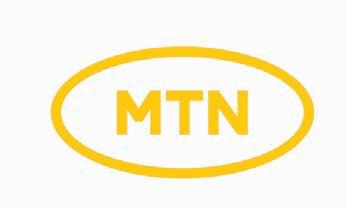
important to build shopping malls that harmonise with the needs of the community.
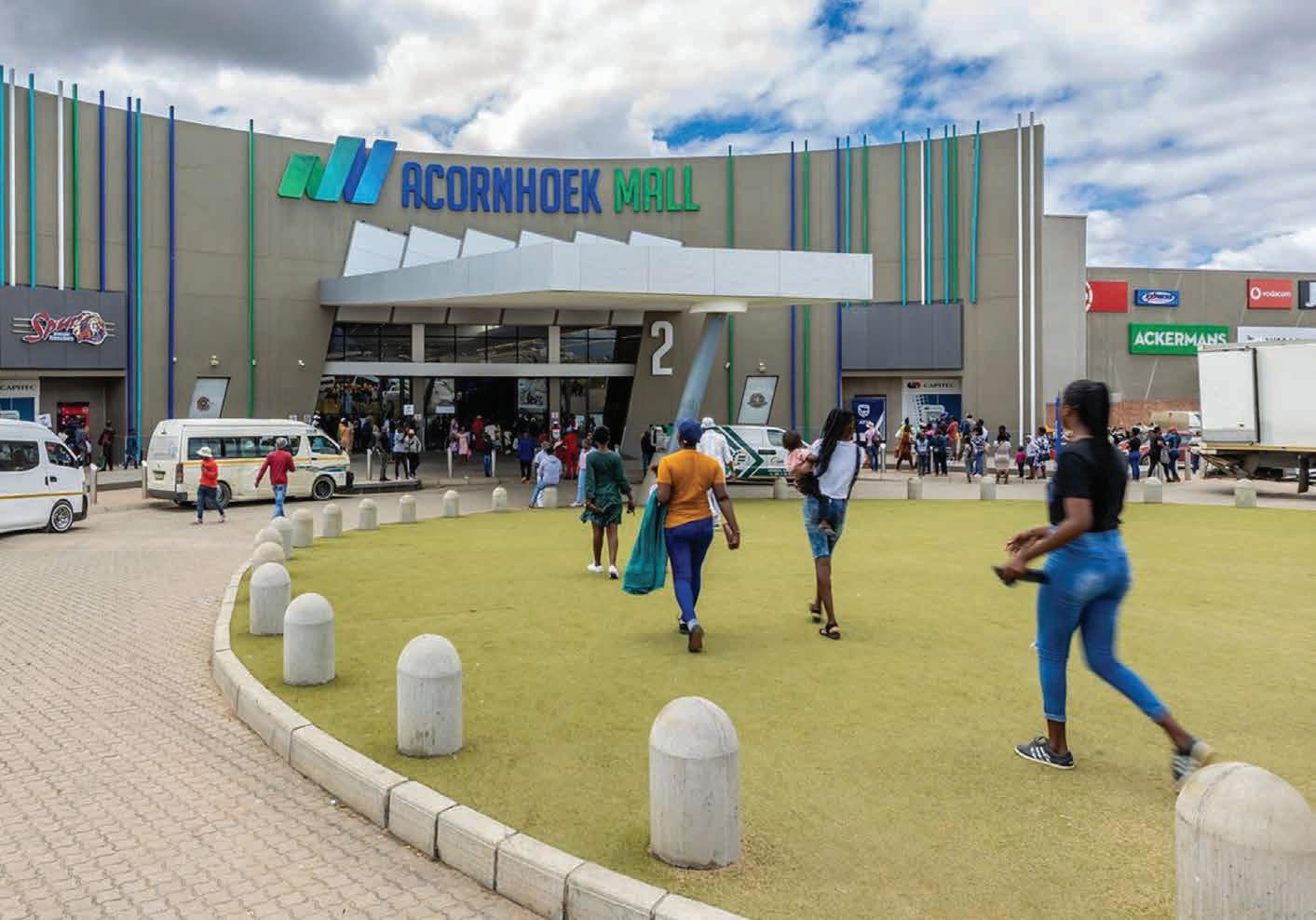
Shopping centres can improve economic prospects for township businesses and the lives of the people who access them, writes TREVOR CRIGHTON
Areport by research company AfricaScope reveals that 532 townships and informal settlements have a larger geographic area than Johannesburg and Durban combined and were home to 21.7 million people in 2019.
While many struggle to access basic services, one area where residents are increasingly well-served is the establishment of accessible
shopping centres and malls. Malls within township areas reduce travel time, improve convenience and support the local economy.
MEETING NEEDS
Property developer New Africa Developments (NAD) has been developing malls and delivering improved retail experiences in townships and rural areas since 1991. Some of its key properties
“ESTABLISHING MALLS IN TOWNSHIPS CREATES CENTRAL BUSINESS DISTRICTS THAT BECOME HUBS.” – JAPIE VAN NIEKERK
include Mams Mall in Mamelodi, Acornhoek Mall and Dwarsloop Mall on the busy R40 in the Bushbuckridge region of Mpumalanga and Jubilee Crossing in Hammanskraal.
NAD CEO Japie van Niekerk says it’s important to build shopping malls that harmonise with the needs of the community.
“This instils local pride and ownership, which cements respect into its foundation.


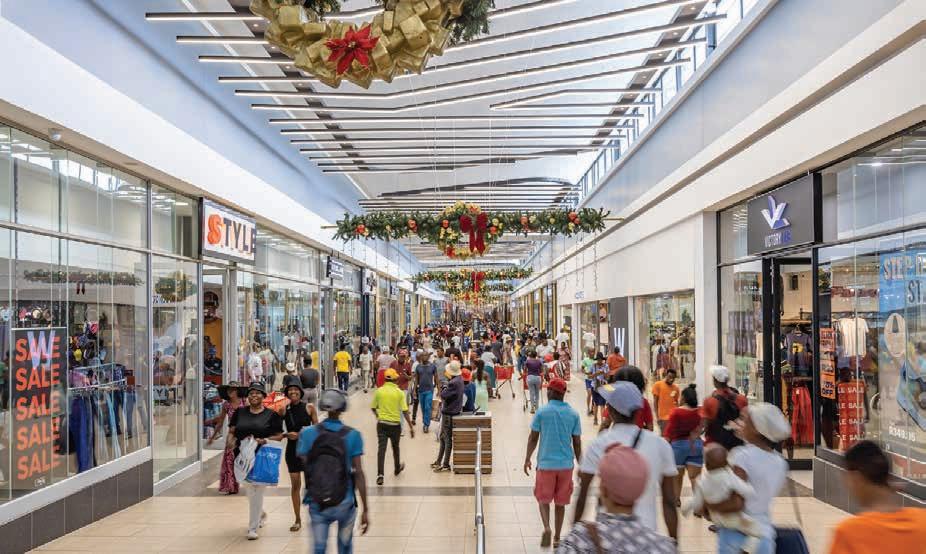
“A SHOPPING CENTRE ALSO CREATES ECONOMIES OF SCALE THAT CONTRIBUTE TO THE DEVELOPMENT OF MARKETS, WHICH HAS SPIN-OFF BENEFITS FOR OTHER BUSINESSES IN THE TOWNSHIP.” – CRAIG SCHWABE
“Our company’s mission is to ensure that what shoppers experience is world-class. And this starts by creating a sense of belonging,” he says. Van Niekerk adds: “They become the heartbeat of a community – leading to empowerment through the infrastructure, business opportunities and jobs they create. Such is the inevitable result of our developments.”
Africascope director Craig Schwabe says there is an increasing need for malls in townships to serve residents’ needs despite current economic challenges. “There is still opportunity for shopping malls in unserved townships and the ability to fill the gaps


Van Niekerk agrees that some malls in more affluent areas have struggled, but says NAD’s township malls have faced no more than “the usual challenges”. “This is partly because land is so scarce in townships, so there’s less competition than in more developed areas,” he explains.
Van Niekerk says that when it comes to seeking out areas to establish new malls in townships, the usual “location, location, location” rule applies as it does to all property developments. “Site selection is stringent and we ensure that where we develop, there’s a healthy level of disposable income and the site is accessible to lots of people – that also makes the availability of access roads critical,” he comments. “People need to get to shopping centres easily and conveniently, whether by vehicle or foot.”
 Craig Schwabe
Craig Schwabe
with smaller forms of shopping centres,” he says. Schwabe adds: “The size and type of shopping mall is very dependent on the character of the market. I believe there is still opportunity for the smaller format shopping malls in townships, as long as there is sufficient market.” While malls outside townships continue to face increased vacancy challenges, which township malls don’t seem to suffer from, Schwabe says it’s down to the type of shopping mall. “The larger format shopping malls, such as super-regional, regional and small regional, tend to have higher vacancy rates, while the smaller formats, such as neighbourhood and community malls, are much better off.”
“THERE IS STILL OPPORTUNITY FOR SHOPPING MALLS IN UNSERVED TOWNSHIPS AND THE ABILITY TO FILL THE GAPS WITH SMALLER FORMS OF SHOPPING CENTRES.” – CRAIG SCHWABE

Once the site is selected, van Niekerk says the aim is to establish a facility that restores the area population’s dignity, giving them access to the best possible, most accessible shopping experience. “We give people high-end malls with a tenant mix that meets their needs –otherwise, they’ll simply continue to travel to other shopping centres further away that better meet their needs,” he says. “That tenant mix is different to malls in Sandton or the Cape Southern Suburbs, with a focus on affordable, recognisable brands that are important to our clients.”
Part of the NAD sustainability strategy is to keep more cash in the communities by, among other methods, providing local businesses with growth opportunities and residents from the surrounding community with access to permanent employment opportunities.
Van Niekerk says establishing malls in townships creates central business districts that become hubs. “A lot of local businesses have opened opposite our malls and have been very successful. Malls enhance shopping and keep trade in townships, so the local economy benefits as well.”
Schwabe says research supports NAD’s experience. “One would think that the establishment of a shopping centre would have
an impact on township businesses – which it does – but there is also the other side of the coin – that is the use of township businesses in closer proximity that residents use for top-up shopping,” he explains. “Economic theory indicates that in establishing a market, one has a hierarchy of retail facilities from the larger shopping malls down to the many smaller businesses. There is no doubt that there is an opportunity for shopping malls to work with smaller businesses to benefit all in a market.”
According to Schwabe, establishing a shopping mall provides diverse products and services to township residents so they are not dependent on travelling long distances to reach shopping malls in suburban areas. “A shopping centre also creates economies of scale that contribute to the development of markets, which has spin-off benefits for other businesses in the township,” he says. “Shopping malls also employ a significant number of residents into primary jobs, but there is also the creation of secondary and tertiary jobs for businesses that supply the shopping mall. If a balance in the hierarchy of retail facilities is achieved in a township, there is generally a benefit”, concludes Schwabe.
NAD aims to empower residents from that township by either using existing local suppliers and skills or upskilling residents. “If there’s a local security or cleaning company that can
“SITE SELECTION IS STRINGENT AND WE ENSURE THAT WHERE WE DEVELOP, THERE’S A HEALTHY LEVEL OF DISPOSABLE INCOME AND THE SITE IS ACCESSIBLE TO LOTS OF PEOPLE.” – JAPIE VAN NIEKERK
deliver at the required standard, we’ll work with them,” says van Niekerk. “If we’re not able to use local suppliers, we focus on skills transfer, where we’ll hire a recognised cleaning company, for example, and have them do the work while transferring skills to local people.
“Once their skills are up to scratch, we try to hand over the cleaning contracts to them. It makes logical sense to use the local plumber as opposed to someone from somewhere else, on condition they can give the quality, service and knowledge and their pricing is competitive.”
One of New Africa Developments’ crown jewels is Mams Mall in Mamelodi. “It’s one of the biggest township malls in the country and a very powerful centre – the whole of South Africa’s economy is in there as far as businesses are concerned,” says the company’s CEO, Japie van Niekerk. He adds: “It’s changed the standards in terms of township malls and, like other malls we establish, has created a new economy that is changing the lives of people who shop there, becoming a safe, social hub for the community”.
The 77 000m2 mall’s anchor tenants include Shoprite, Spar, Boxer, Game and Pick n Pay alongside brands, such as Woolworths, Edgars, Truworths, Ackermans, Mr Price and Pep, to make a total of 160 stores. The Mams Mall offering also includes extensive entertainment spaces, such as gaming arenas and cinemas, clothing boutiques of leading aspirational brands, health and beauty shops, high fashion footwear outlets, banks, cellular stores and a food court with Chicken Licken, KFC, Debonairs, McDonald’s, Romans Pizza and more than a dozen other eateries.
The SASSA and Home Affairs offices attached to Mams Mall provide a further service to the surrounding community by making it convenient for the public to attend to grant collection, shopping and any other official chores in a single visit.
KFC, a leading South African fast-food brand, tells THANDO PATO why it is committed to contributing to the township economy
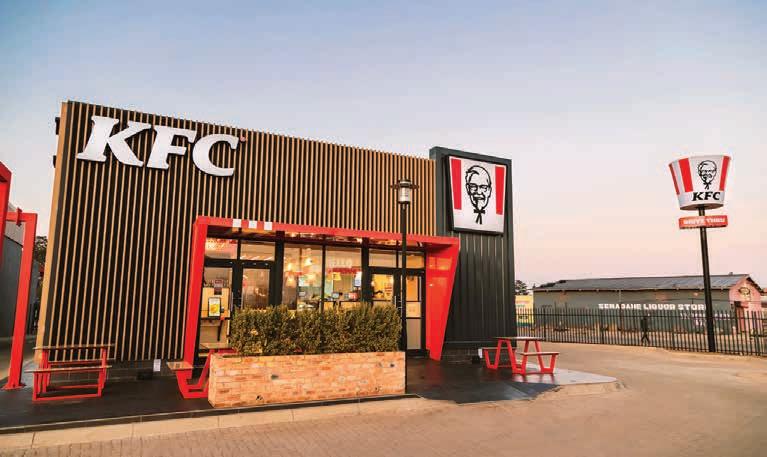
Euromonitor International’s market share data released in 2023 shows that KFC is the most popular fast food in South Africa, leading the market with a 24.3 per cent share of sales. It is also the fast-food brand with the biggest footprint in the country. According to Grant Macpherson, chief marketing officer for KFC Africa, KFC currently has 1 100 outlets nationwide, with 217 located in townships, and plans are in place to introduce more outlets during 2024. “We anticipate opening up to 100 new restaurants, spanning all economic areas, including township areas, this year. We aim to serve all age and economic groups,” he says.

Macpherson says KFC’s presence in townships aligns with the brand’s commitment to community engagement, cultural awareness and integration and local economic development. “KFC is often the first multinational brand to enter these markets; we create hubs that attract other businesses to the regions. Through these efforts, we strive to foster economic growth and enhance the overall wellbeing of township communities.”
KFC currently has 7 000 employees based in townships, and as part of its initiatives to support local communities, branches employ staff from the local communities.
“We prioritise employing our employees locally from the communities where we operate. Moreover, management teams are most often filled internally through promotions, fostering career growth and positively impacting disposable income and economic access within these communities,” he explains.
By being in townships, Macpherson says KFC has been able to learn and localise on a broader scale and introduce local delicacies to its menu.
“In March 2024, as a once-off, we experimented with making local foods, such as milk tart, mealie and biltong KFC, by deep frying them with our 11 special herbs and spices. This was based on listening to consumers on social media.”
Macpherson says KFC’s presence in townships has translated into strong brand loyalty, with it being seen as the preferred fast-food outlet for residents. As part of its goal to develop township communities, KFC has several active corporate social responsibility programmes throughout the country, for example, the KFC Mini-Cricket programme.
“The KFC Mini-Cricket programme has allowed us to engage actively with youth from all walks of life. Through Mini-Cricket, we introduce children
between the ages of 3 and 12 to cricket, allowing them to get active, make friends, and develop South Africa’s young champions. “KFC Add Hope is another programme that has allowed us to be active in communities. Through R2 donations from customers and KFC’s own contributions, we can provide nutritious meals to over 140 000 children around the country. In short, being available in township areas goes beyond doing just business. It is about making a positive impact, whether through corporate social responsibility programmes, local economic development or serving our delicious product. We are proud to be a part of these communities and we remain committed to continuing our efforts to serve and contribute as best we can,” Macpherson concludes.
According to Insight Survey’s SA Fast Food/QSR Industry Landscape Report 2023,the local fast food industry is forecasted to grow at a high compound annual growth rate (CAGR) of nine per cent between 2023 and 2027. Despite the restrictions and impact of the COVID-19 pandemic, sales grew by 19.4 per cent between 2021 and 2022. The projected CAGR growth for 2027 is based on the ongoing load-shedding crisis, drive-thru technology and innovation, rewards and cashback offerings, and the growing popularity of local fast-food flavours, offerings and marketing.
SA Fast Food Industry Report

KFC CURRENTLY HAS 7 000 EMPLOYEES BASED IN TOWNSHIPS, AND AS PART OF ITS INITIATIVES TO SUPPORT LOCAL COMMUNITIES, BRANCHES EMPLOY STAFF FROM THE LOCAL COMMUNITIES.
The SPAR Supplier Development Programme is opening doors for hundreds of small, rural businesses across South Africa, writes MPUDI MAUBANE , National PR, Communications and Sponsorship Manager at The SPAR Group
“Small local farmers are making waves in the industry by disrupting the status quo from honey, confectionery, pickles to fresh produce we are seeing a myriad of entrepreneurs fast changing the current economic landscape.” The SPAR Supplier Development Programme (SSDP) inspires small local businesses to reach new heights by accessing a broader market.
There is little doubt that South Africa’s township and rural economies have immense potential. Locally produced food products are particularly popular in townships, with just under 50 per cent of respondents in the latest Rogerwilco Township CX Report having bought food prepared and manufactured in townships. The report says that 51 per cent of respondents claim that they shop at spaza shops daily, and 23 per cent spend 25–50 per cent of their income (24 per cent spending more than half their income) in townships.
Access to funding, a lack of technical support, food safety expertise, compliance and infrastructure, and logistical resources needed to enter formal value systems continue to hold back small producers in South Africa.
Most major supermarkets and food manufacturers prefer working with a few
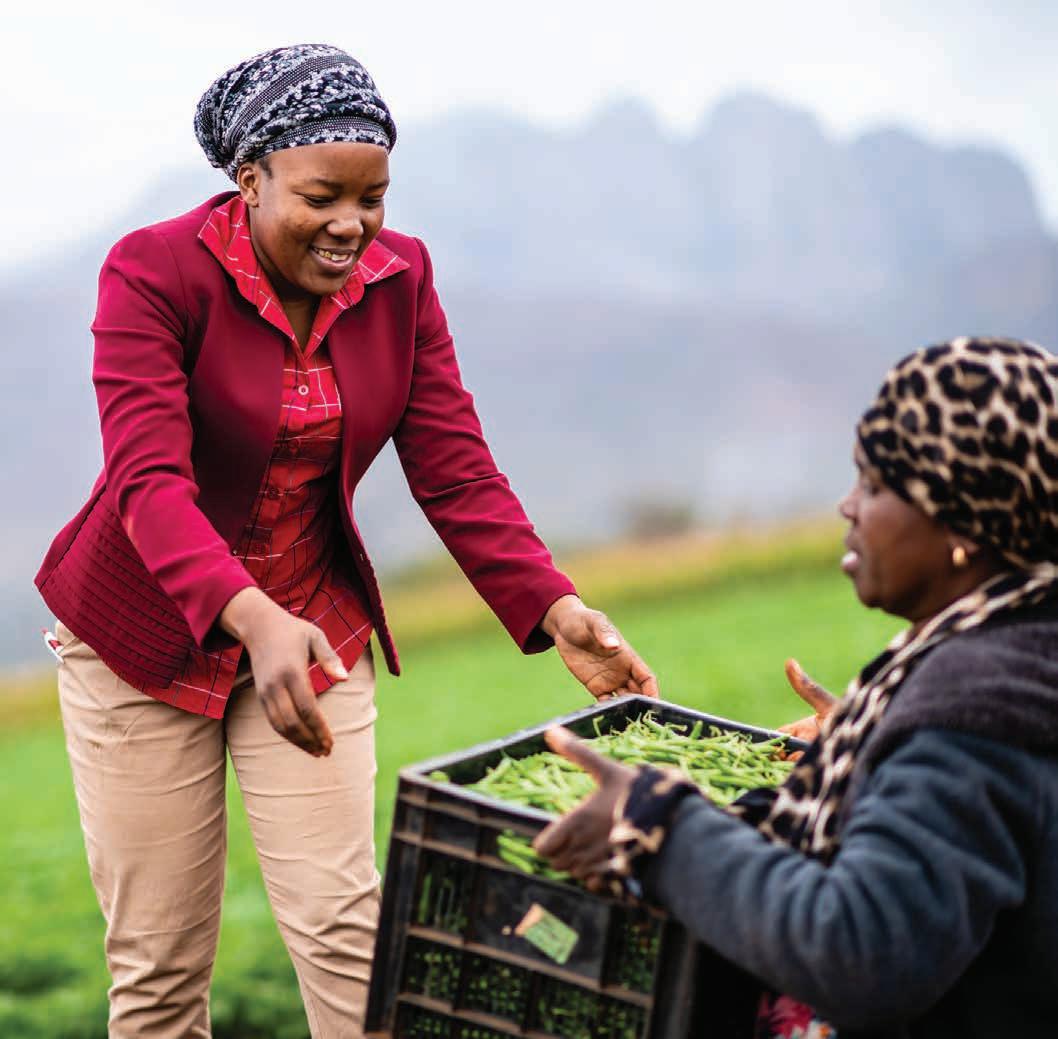
larger suppliers that can meet stringent requirements. This leaves many small producers excluded and marginalised as they cannot meet the quality or consistent volume requirements for large corporations to consider dealing with them.
At The SPAR Group, we believe the retail industry must play a central role in helping close these gaps. Since the launch of our SSDP in September 2022, we have taken decisive steps
to provide much-needed support to improve the success rate of many of the impressive businesses in South Africa that have not been given the chance to succeed.
The SSDP supports these businesses on their growth journey by ensuring they can meet the standards set in the retail sector. Our programme helps micro and small food suppliers become fully compliant in delivering safe food-based products to stores. It opens the pathway to big orders, a network of support and a much broader value chain than
WE HAVE TAKEN DECISIVE STEPS TO PROVIDE MUCH-NEEDED SUPPORT TO AND IMPROVE THE SUCCESS RATE OF MANY OF THE IMPRESSIVE BUSINESSES IN SOUTH AFRICA THAT HAVE NOT BEEN GIVEN THE CHANCE TO SUCCEED.
they would have been able to access. They are given all the tools, knowledge and access to industry specialists to achieve their full potential effectively and affordably.
The programme provides suppliers with training and support on topics, such as food safety, quality assurance and good manufacturing practices. Suppliers are then given access to a marketplace to promote products and services to other SPAR stores. A national marketplace where they can network automatically becomes available when they achieve the required compliance status.
We love using local products, so we are extremely pleased that there are now around 900 suppliers on the programme, and 95 are fully compliant, with more to follow. Hundreds of suppliers continue to sign up, and we encourage more to join – this is a powerful way to take that next step up the value chain and overcome many of the traditional hurdles small businesses face.
Successes include Bokamoso Foods’ ‘BEE Loved’ pure honey, now among the supplier development products available to SPAR stores countrywide through this programme.
Afrikoa’s Bean-to-Bar chocolate is gaining new waves of customers with a sweet tooth, while other suppliers, such as From the barkery and Vuyisile Veggies, continue to make major inroads as they gain new customers. Naani’s Pickles,

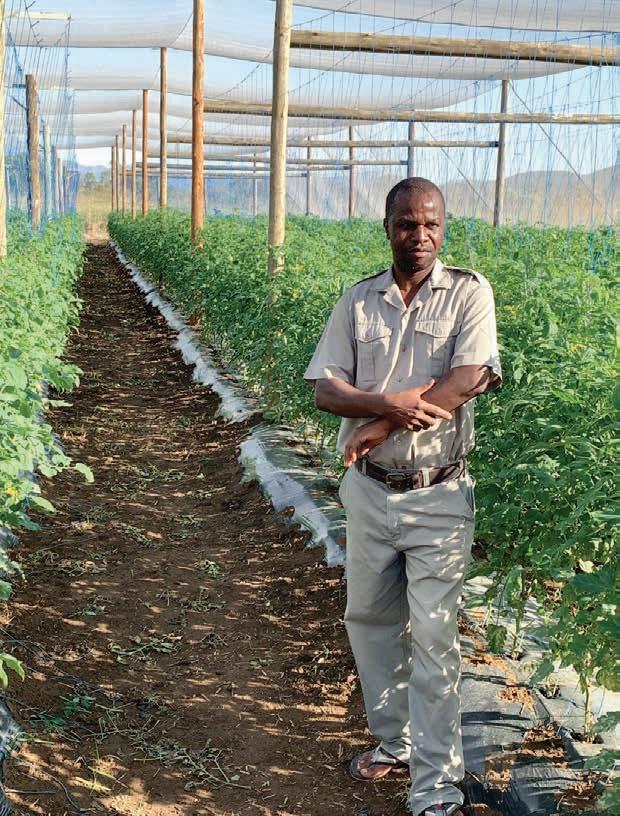
Forest Fairies sweet company, Plant Factory Gania Farms fresh produce and Villa San Giovanni Italian Deli are other examples of how small businesses – if given the proper support through this programme – can thrive in South Africa.
There is no doubt that local is lekker. At SPAR, we want to see the country’s remarkable small businesses succeed and grow. Our hope is that, in turn, this will spark gross domestic product growth and help close the unemployment gap.
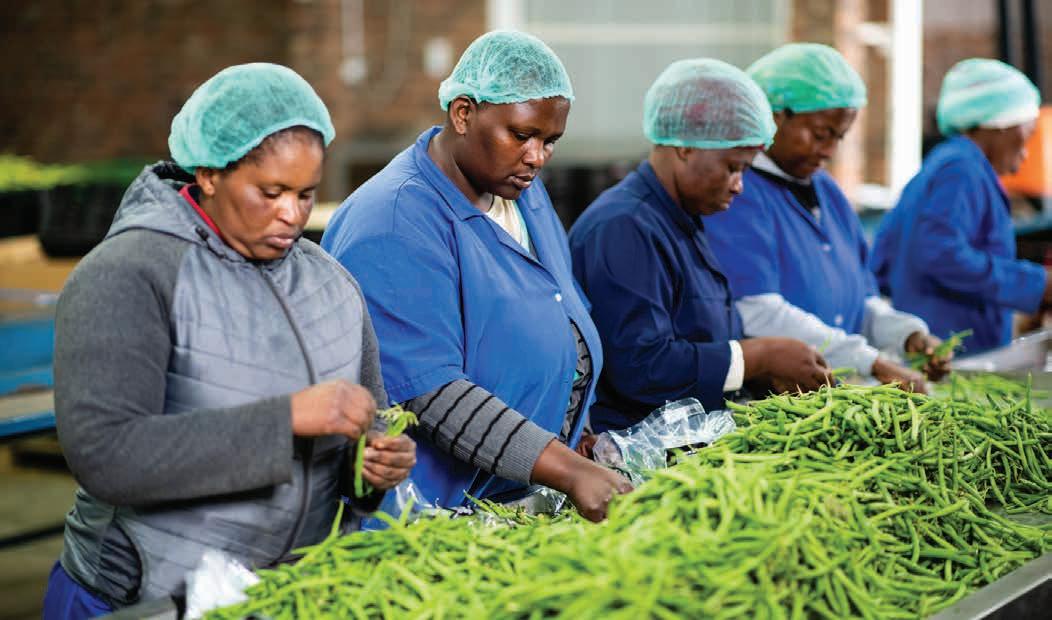
The SPAR Group encourages all retailers to visit the SPAR Supplier Development Programme portal and visit the marketplace for products that can be ordered and stocked in stores, while small businesses are invited to join the SPAR Supplier Development Programme by visiting: sparsupplierdevelopment.co.za.

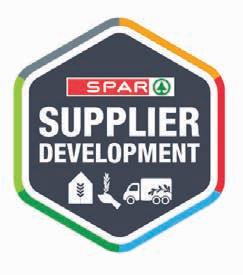
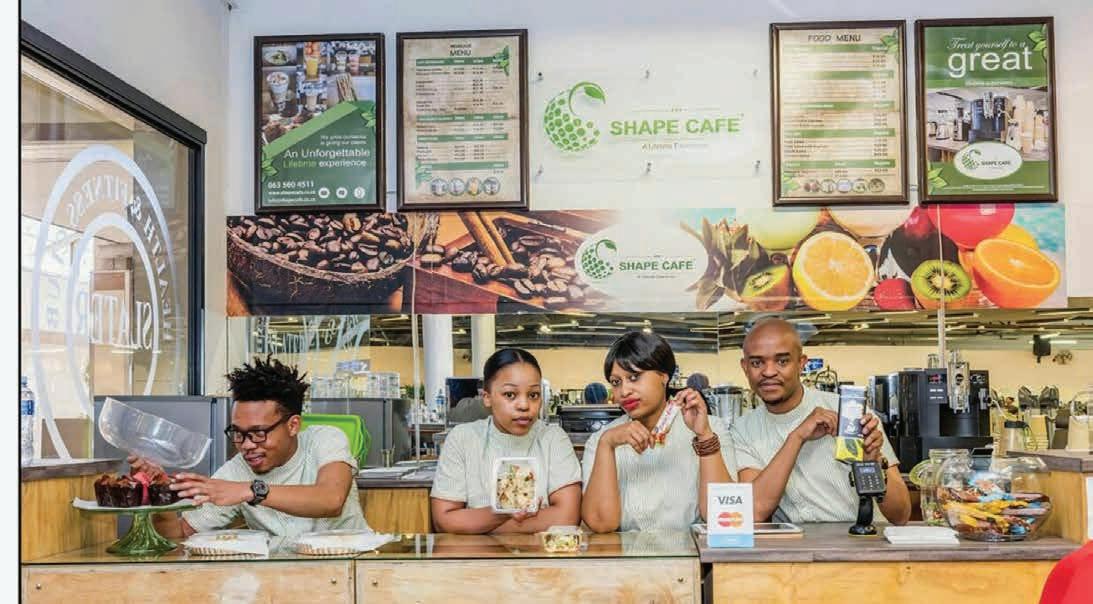
ITUMELENG MOGAKI discovers how a phoenix rose from the ashes in the heart of Sebokeng
In the bustling heart of the township of Sebokeng, where the aroma of freshly brewed coffee intertwines with the spirit of entrepreneurship, lies Shape Café. This community-centric haven not only serves beverages, but also fosters a nurturing space for local visionaries to thrive. At its helm stands Itumeleng Hlapane, a social entrepreneur, CEO and founder of Shape Café. His resilience and dedication have weathered storms and kindled hope in the community he serves.
“It all started with a simple idea,” Hlapane says, recalling the birth of Shape Café. “I wanted to create a space where township entrepreneurs could thrive, collaborate and receive the support they need to turn their visions into reality.
“Shape Café is more than just a café; it’s a sanctuary for dreams,” remarks Hlapane. “Our aim is to provide not just a place to sip coffee, but also a space where township entrepreneurs can connect, collaborate and grow.”
Both triumph and adversity have marked Shape Café’s journey. In July 2021, during the countrywide riots that also swept through Sebokeng, the café suffered a severe blow. Windows shattered, equipment was damaged and morale shaken; it seemed as if the dreams woven within its walls would crumble.
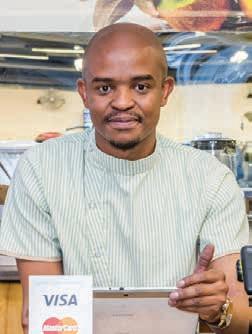
However, amid the chaos, Hlapane conducted several crowdfunding campaigns within his community, receiving generous donations to sustain his business operations.
“In a pivotal moment, AVBOB stepped in to support us, facilitating our business’s revival. Impressed
“I WANTED TO CREATE A SPACE WHERE TOWNSHIP ENTREPRENEURS COULD THRIVE, COLLABORATE AND RECEIVE THE SUPPORT THEY NEED TO TURN THEIR VISIONS INTO REALITY.” – ITUMELENG HLAPANE
“BY INVESTING IN GRASSROOTS INITIATIVES AND FOSTERING AN ECOSYSTEM OF SUPPORT, WE CAN UNLOCK A WEALTH OF OPPORTUNITIES AND UPLIFT MANY COMMUNITIES.” – ITUMELENG HLAPANE
by our responsible financial management, it continued its support after we demonstrated our commitment to governance and compliance.
“Additionally, the Nahana Foundation, via one of its affiliated companies, McCann, extended financial assistance to us in response to the challenges we faced during the riots. To our delight and gratitude, Safari Investments, the owner of Thabong Mall, also stepped up and made financial contributions and other forms of support to our business.
“All these angel investors played a key role in our resurgence. It wasn’t just about rebuilding the physical structure; it was about rebuilding hope and community,” Hlapane explains.
“We saw the rebuilding phase as an opportunity to reinforce our commitment to the township economy. We doubled down on our efforts to support local businesses, providing them a platform to thrive.”
Shape Café became more than just a space for caffeine enthusiasts; it evolved into a catalyst for economic empowerment. From hosting workshops and mentorship programmes to offering free resources and networking opportunities, the café became a nurturing ground for budding entrepreneurs.
“As a social entrepreneur, my vision goes beyond profits,” Hlapane comments. “It’s about creating a ripple effect of positive change within our community. Shape Café is just one piece of the puzzle: the real magic lies in the dreams we ignite and the lives we transform.”
Looking to the future, Hlapane says the township economy is brimming with untapped potential. “By investing in grassroots initiatives and fostering an ecosystem of support, we can unlock a wealth of opportunities and uplift many communities.”
As Shape Café continues to flourish, Hlapane remains steadfast in his commitment to catalysing change and empowering dreams. With every cup poured and every connection made, his business stands as a testament to the transformative power of community collaboration. He concludes: “My philosophy in life is, you give, you get; you learn, you teach. We are not just shaping coffee; we are also shaping futures.”
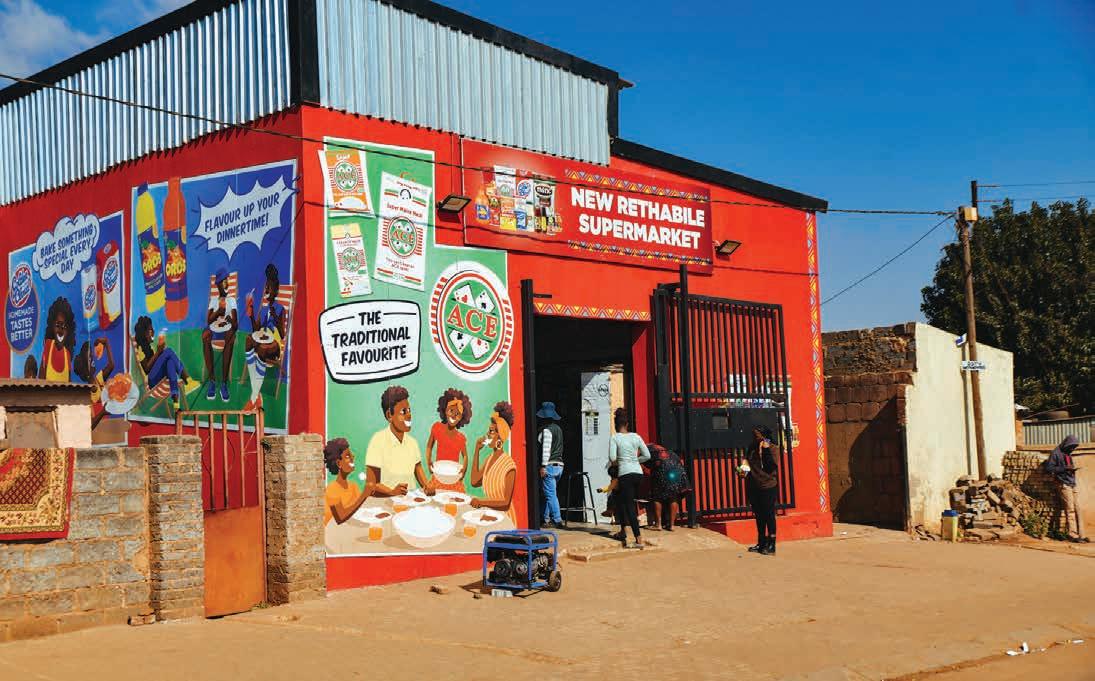
THANDO PATO follows Tiger Brands into the townships to see how the company’s Route-to-Market strategy is benefitting spaza shops
Research released by Accenture Africa in 2023 revealed that more than 150 000 spaza shops make up part of South Africa’s “hidden economy”, which has an estimated market size of R178-billion. In 2022, Trade Intelligence announced that more than 70 per cent of South African households purchase from informal traders, which include hawkers, small and large spazas, superettes and mini and midi wholesalers.
To help boost the growth of the multibillion-rand revenue-generating market, last year, JSE-listed food producer Tiger Brands expanded its presence in the informal trading market with its Route-to-Market strategy. Using this
Luigi Ferrini
strategy, over the next five years, Tiger Brands aims to support 130 000 general trade stores in townships, informal settlements and rural areas nationwide by improving its distribution network and advertising and providing job opportunities.
“With the local informal market remaining largely untapped and statistics showing that it is growing at a faster rate than the modern trade, we see exponential room for growth in this segment and are engaging closely to support our traders and better present our brands to consumers at the point of purchase,” says Luigi Ferrini, chief customer officer, Tiger Brands.
Challenges informal traders often face, states the 2023 Accenture Africa report, include:
• inefficient supply chains resulting in products selling out and traders losing revenue;
• limited bulk buying power;
• due to their location in the townships, traders are usually far away from wholesale retailers; and
• bulk storage limitations.
South Africa’s informal sector contributes at least six per cent of the gross domestic product and accounts for one-third of local jobs (Stats SA, 2021).
The South African fast-moving consumer goods informal independent market grew at an average rate of 6.7 per cent between 2018 and 2023.
By 2030, small retailers are anticipated to create 70 per cent of all new jobs.
Shoppers visit spazas four times per week on average compared to supermarkets, which shoppers visit once a week.
Source: Tiger Brands
Below are some of Tiger Brands’ Route-to-Market key tactical initiatives to help traders acquire stock safely, increase sales and understand their customer needs.
• Introduction of a mobile cashless payment and order platform solution that ensures stock is delivered within 48 hours.
• A trader loyalty rewards programme that offers incentives to encourage traders to increase their Tiger Brands stock orders.
• Using data and shopper insights to ensure traders have an optimal product range.
• Shopper communication and brand marketing campaigns at the point of sale (POS).
So far, according to Tiger Brands, its Route-to-Market has reached more than 46 500 general trade outlets across South Africa.
In addition, Tiger Brands is working with customers to create what it calls Perfect Outlets. The aim is to establish 2 000 Perfect Outlets over the next five years – these will be kitted out with mural stories around some of the company’s most recognised heritage brands.
Since introducing the Route-to-Market strategy, Tiger Brands has seen growth in product consumption in the informal sector. Between 2018 and 2023, Tiger Brands’ consumer basket size increased in Tembisa by 185.7 per cent. Product distribution in Tembisa increased from 28.5 per cent in 2020 to 97.3 per cent in 2023.
“WE SEE EXPONENTIAL ROOM FOR GROWTH IN THIS SEGMENT AND ARE ENGAGING CLOSELY TO SUPPORT OUR TRADERS AND BETTER PRESENT OUR BRANDS TO CONSUMERS AT THE POINT OF PURCHASE.” – LUIGI FERRINI

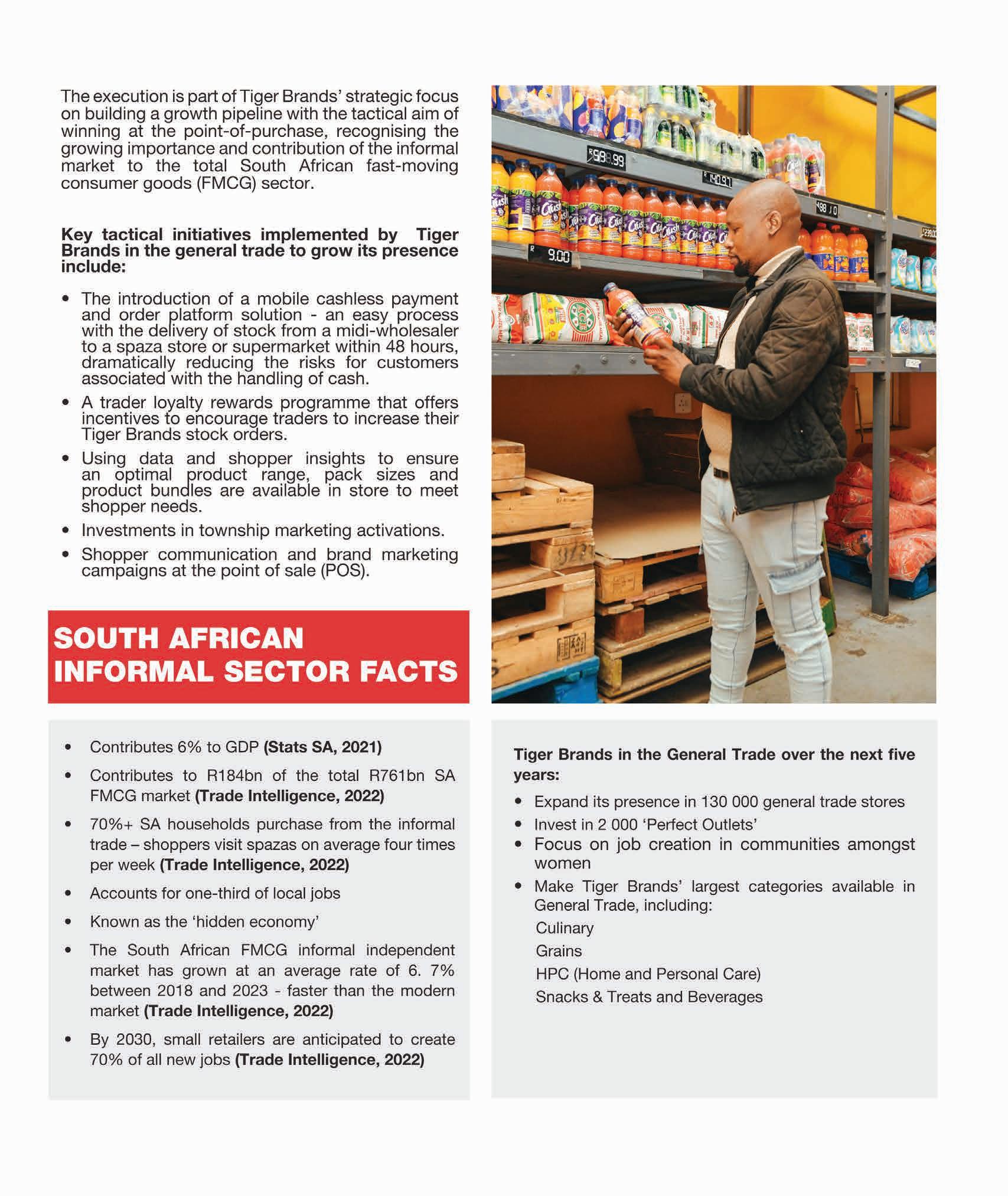
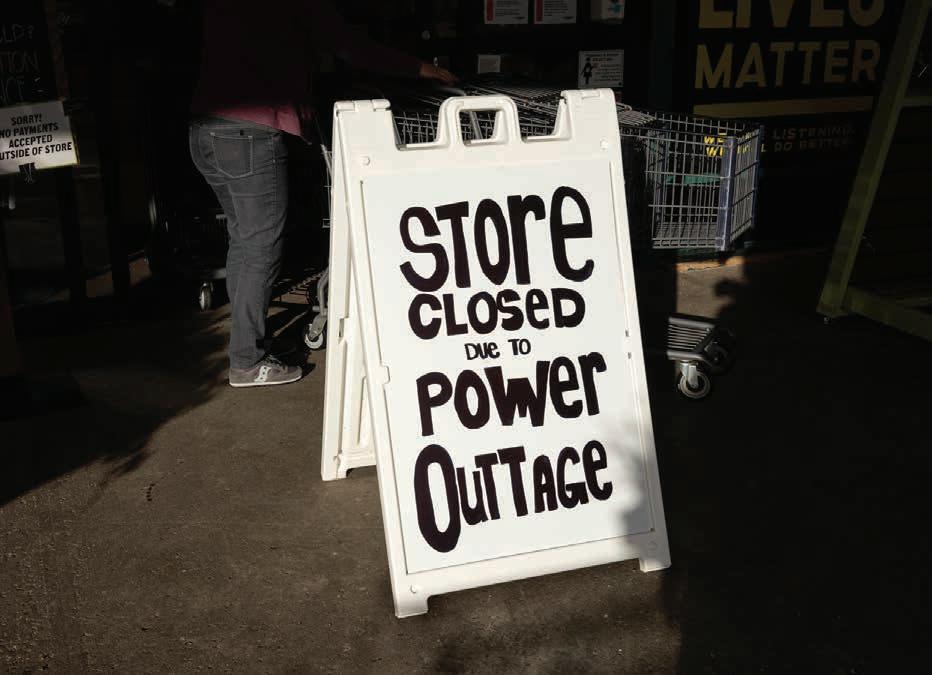
In the face of unrelenting load shedding, township businesses are leaning to adapt, writes ITUMELENG

Nestled amid the vibrant community in the heart of Soweto’s Orlando West, Smokeville Restaurant stands as a beacon of resilience. Co-founded by Bonginkosi Mzila, this grill house offers a diverse menu catering to adults and children with its tantalising array of meat, vegetarian and pizza dishes. But behind the sizzle of their grills lies a story of innovation and adaptability in the face of a common South African challenge: load shedding.
Load shedding, a phenomenon familiar to businesses nationwide, poses unique challenges for township enterprises. Traditional solutions, such as generators and UPS systems, often fall short, leaving businesses grappling with power outages and their repercussions.
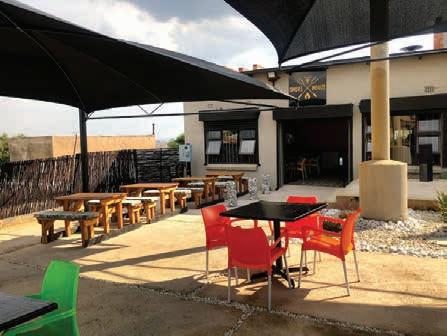
larger generator capable of powering their establishment and the neighbouring households. “By extending our power supply to nearby residences, we bolstered security measures and fostered community resilience,” he states.
Yet, the challenges didn’t end with power outages. Water supply issues further tested the grill house’s ability to continue operating.
“Water-shedding programmes disrupted our operations, which require a continuous supply for kitchen and sanitation purposes,” Mzila remarks. To combat this, at the beginning of the year, Smokeville invested in a borehole, ensuring a reliable water source and enhancing self-sufficiency.

Mzila sheds light on Smokeville’s journey, revealing the hurdles they encountered and the inventive strategies they devised to overcome them.
“Initially, we relied on a small generator and UPS to keep our operations running,” Mzila says. “But as demand grew and load shedding persisted, we realised these solutions weren’t sufficient.” The inadequacy of their initial setup became apparent as the strain of powering essential equipment, coupled with prolonged outages, took its toll.
Community safety emerged as a paramount concern. “With darkness descending on the neighbourhood during outages, security risks escalated,” Mzila explains. In response, Smokeville upgraded to a
Collaboration emerged as a cornerstone of Smokeville’s resilience strategy. Mzila highlights partnerships with the local community policing forum (CPF) to bolster security measures during events and load shedding. “By engaging CPF members and providing them with resources, we not only enhance security, but also create employment opportunities within the community.”
Mzila has a message to fellow township businesses facing similar challenges. “To those without the financial means for innovative solutions, I urge you to amplify your voices. We must hold authorities accountable for neglected infrastructure and demand they prioritise community welfare over political agendas.”
“BY EXTENDING OUR POWER SUPPLY TO NEARBY RESIDENCES, WE BOLSTERED SECURITY MEASURES AND FOSTERED COMMUNITY RESILIENCE.” – BONGINKOSI MZILA
Another restaurant situated on the globally acclaimed Vilakazi Street in Soweto, whose co-founder has chosen to maintain anonymity, outlined the business’s innovative strategy to continuously draw in customers and sustain operations. Its approach involves a blend of environmental consciousness by going green and revisiting the charm of candlelit dinners.
Describing the ingenuity behind the approach, the restaurant’s co-founder says: “We refuse to succumb to the limitations imposed by load shedding. Instead, we’ve turned our business into an opportunity to innovate and connect with our community in new ways.”
The restaurant’s arsenal against power cuts includes a solar-powered microgrid. This sustainable energy source keeps the lights on and powers essential appliances, ensuring uninterrupted service to patrons.
But the innovation doesn’t stop there.
Understanding the importance of connectivity in a digital age, the restaurant offers free Wi-Fi powered by a combination of solar and backup battery systems. “Access to the internet is crucial, especially during load shedding when people rely on alternative means for communication and information,” the co-founder notes.
Furthermore, the restaurant has embraced low-tech solutions, such as candlelit dinners and acoustic jam sessions, fostering a sense of community camaraderie in the face of adversity. “Load shedding doesn’t have to dampen our spirits; it’s an opportunity to come together, share stories and create unforgettable moments,” the co-founder adds.
Service delivery suffers
Uhuru Family Restaurant in Tshepisong Phase 4, just on the outskirts of Sharpeville, is also not without its fair share of challenges when it comes to power cuts, service delivery and overall business hiccups. The restaurant’s founder and head creative director, Modisana Ralesai, best describes the establishment as a creative space that doubles up as a restaurant. She details how what started as a street business back in 2018 evolved into a space where creativity takes centre stage.
“We are not a commercial business because we have created a multifunctional environment, from serving kasi delicacies on certain days of the week to accommodating local designers, running fashion and cooking shows, right up to private bookings and birthdays,” says Ralesai.
“Naturally, like many township businesses, we often have to deal with load shedding. That affects the business operations on many fronts, including our kitchen, fridges, lights, etc.”
Ralesai emphasises the issue of service delivery as a major obstacle they have to deal with. “Not to speak ill of our Emfuleni local municipality, our local administrative centre, but the evident and regular community protests are a testament to the challenges we have to deal with as a community at large.”
Ralesai also highlights one of the most dangerous and often many a township’s problem – illegal electricity connections. “We also have illegal electricity connections, which exacerbates our problems as the community of Tshepisong. These connections are not only on the wrong side of the law but also dangerous to the young and old. From a business point of view, when these illegally connected power lines trip, we are also found to be without electricity, sometimes for weeks on end.”
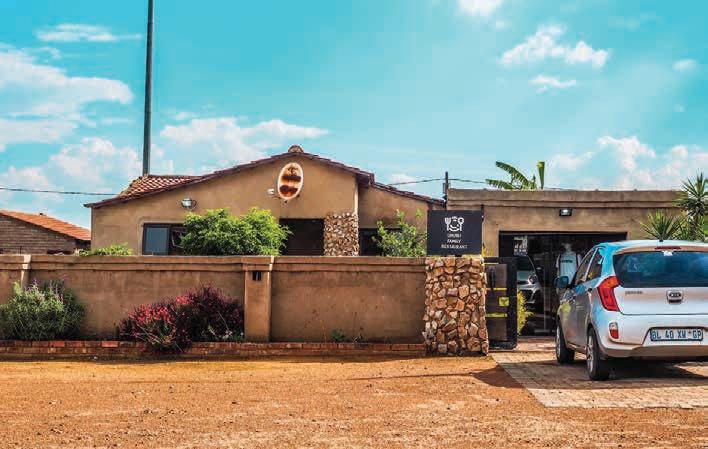
Ralesai says that to keep their business running, they had to invest in a generator to help keep the lights on, “literally and figuratively”. “We also
“We also make use of solar lights as an added measure.” – Modisana Ralesai
1. Solar panels: to generate electricity during daylight hours, reducing reliance on the grid and minimising downtime during load shedding.
2.Inverters: battery backup solutions to store excess energy generated during non-load-shedding periods for use during power outages.
3.Generators: diesel or petrol generators to provide backup power during load shedding, offering a reliable and immediate solution to keep operations running smoothly.
4. Energy-efficient equipment: upgrade to energy-efficient appliances and machinery to reduce overall power consumption, lessening the impact of load shedding.
5. Demand management systems: implement smart energy management systems to monitor and regulate electricity usage, optimising consumption patterns and minimising disruption during load shedding.
make use of solar lights as an added measure. But it’s also important to note that petrol does not come cheap these days. What with the umpteenth petrol hike this year.”
owners, Ralesai also advocates for local governments to find speedy and long-lasting resolutions to challenges.
to water supply and many other problems we face daily, our government must really prioritise our needs. Uhuru is in business to motivate others to seize entrepreneurial opportunities; without power, we are powerless,” Ralesai concludes.

